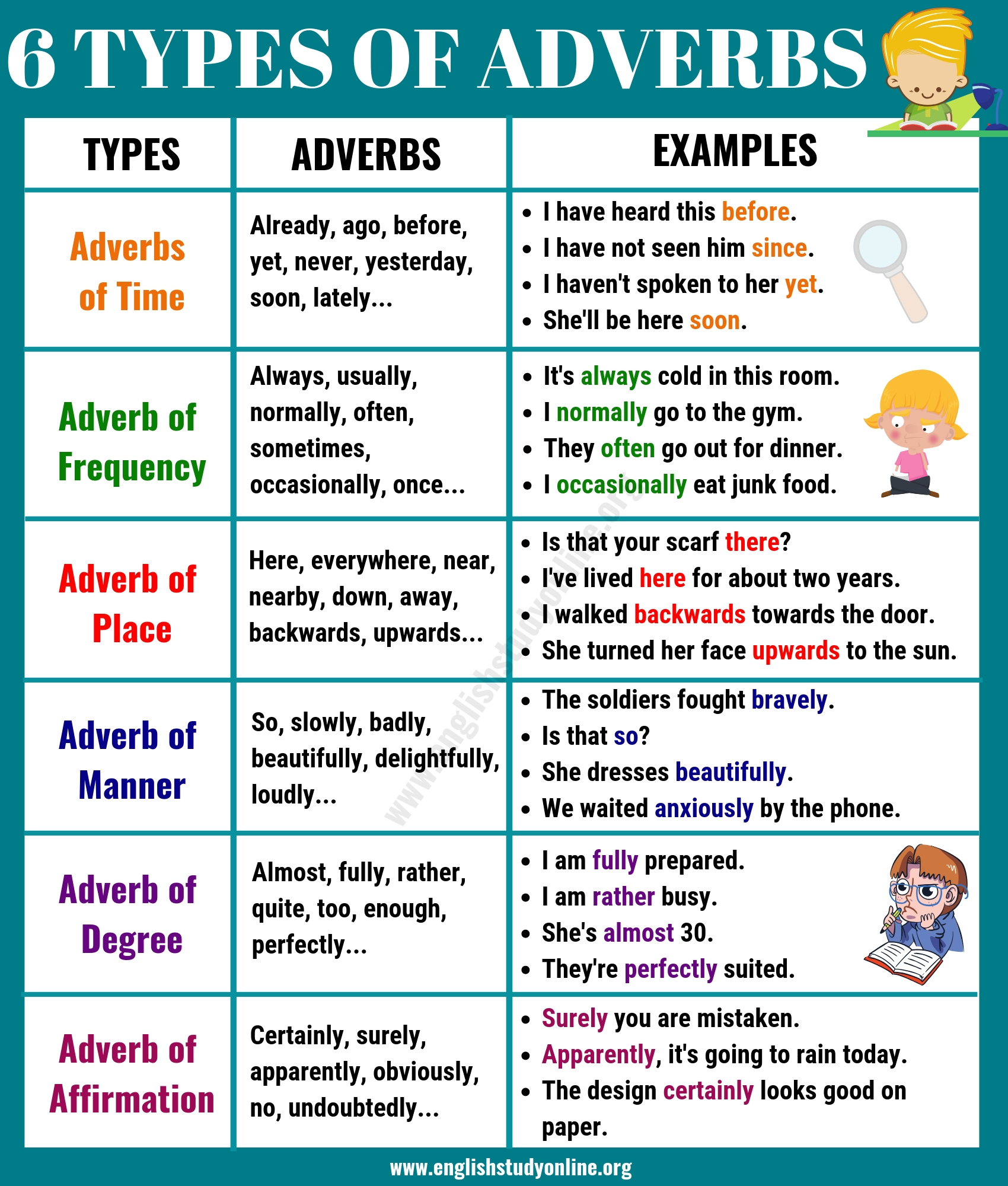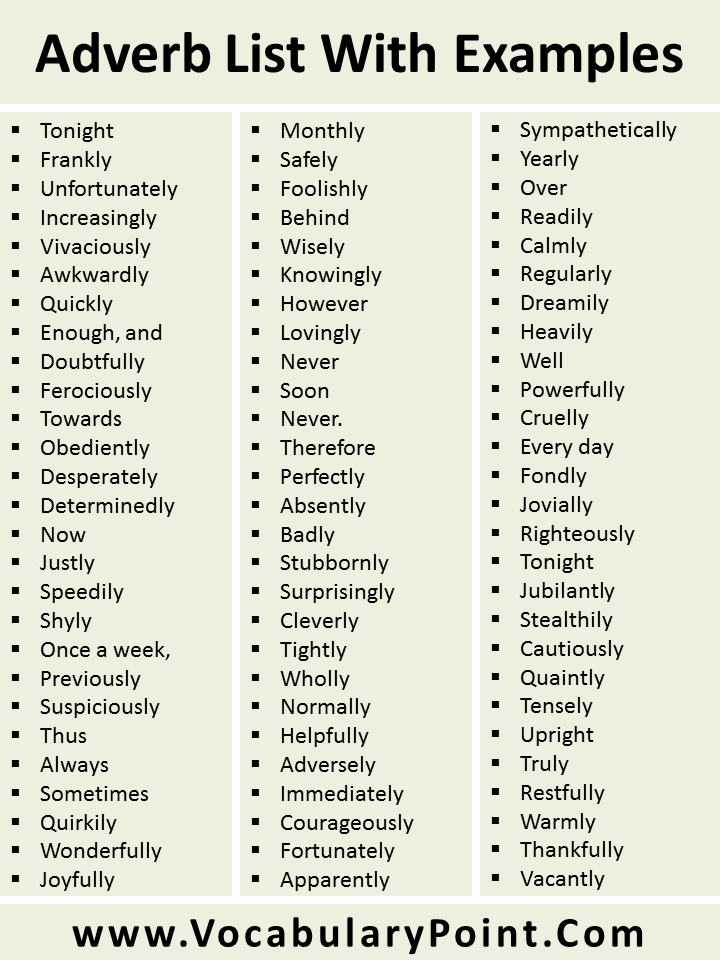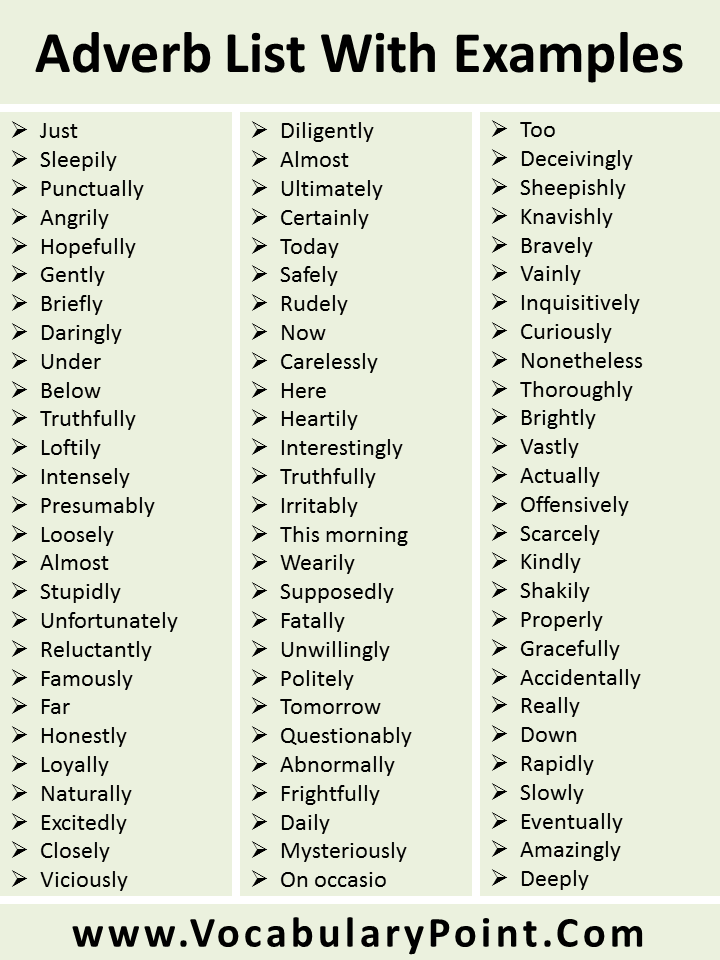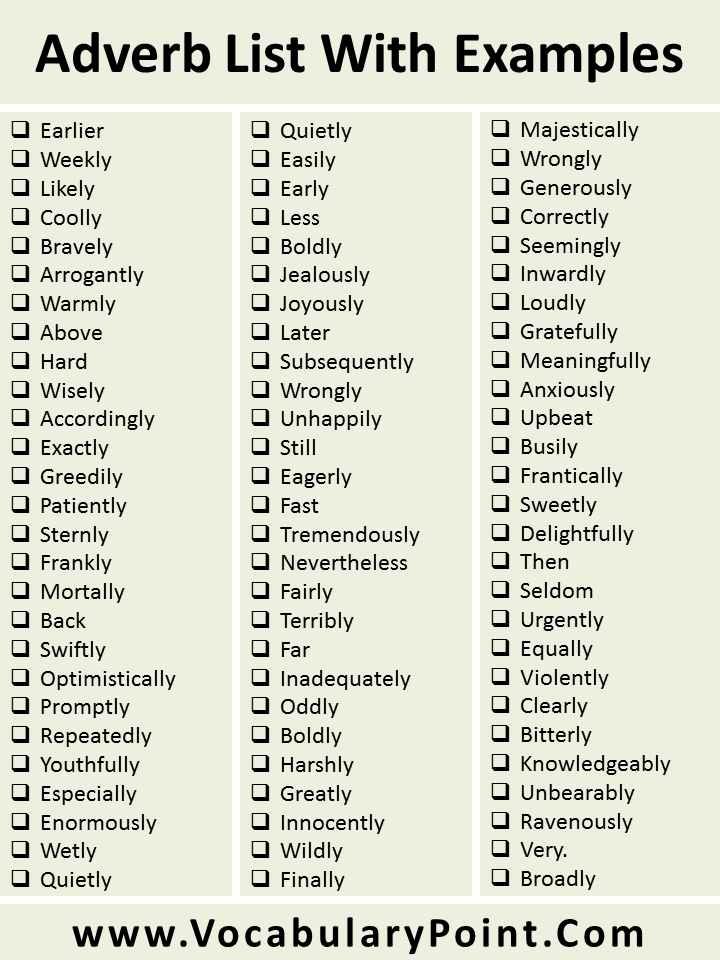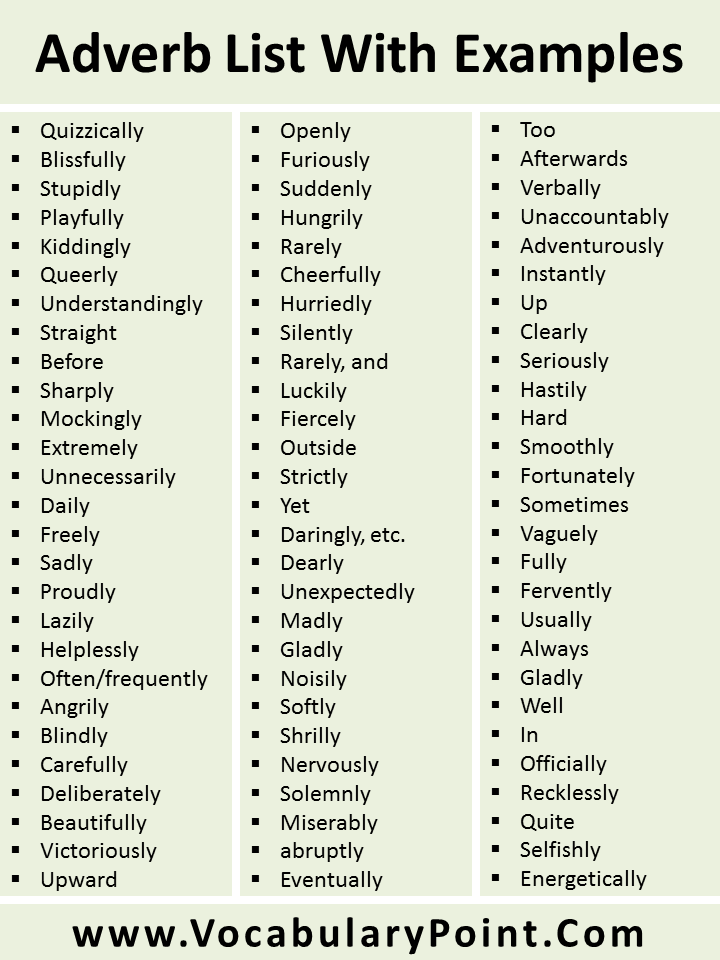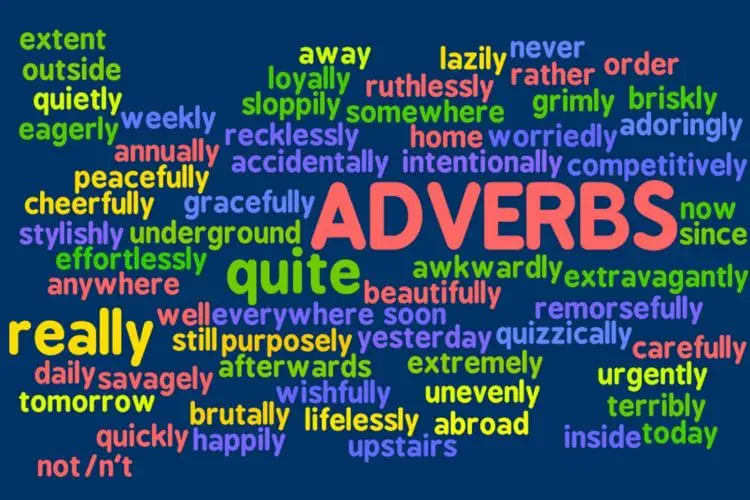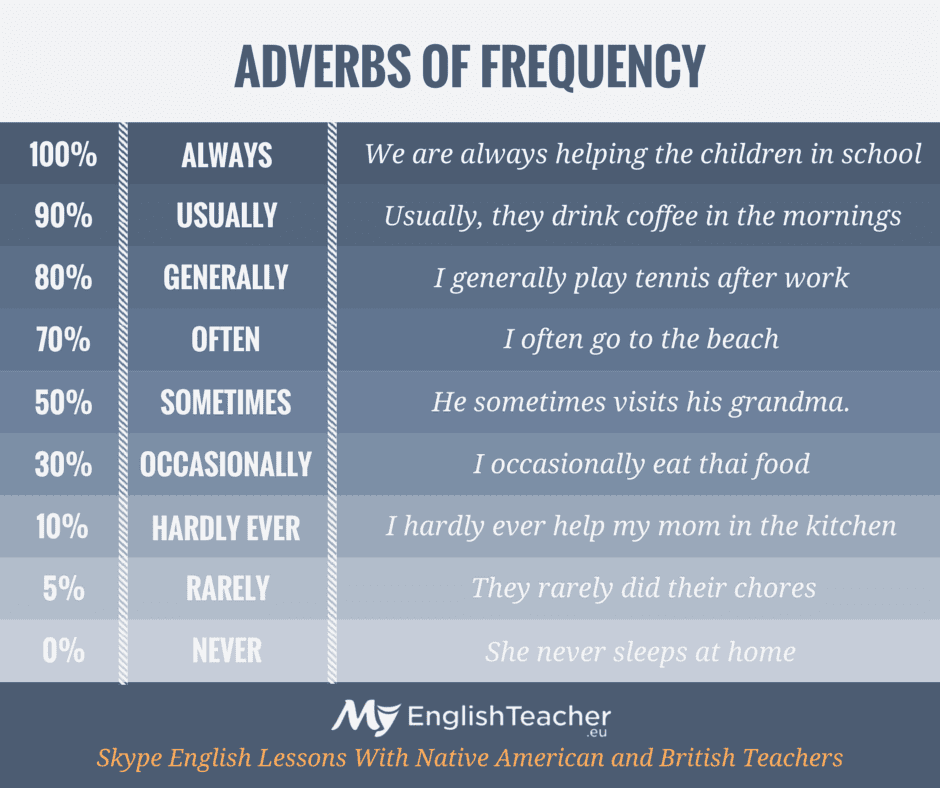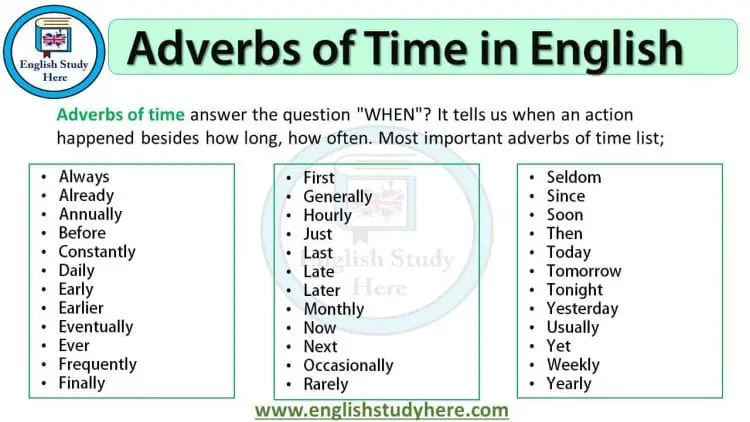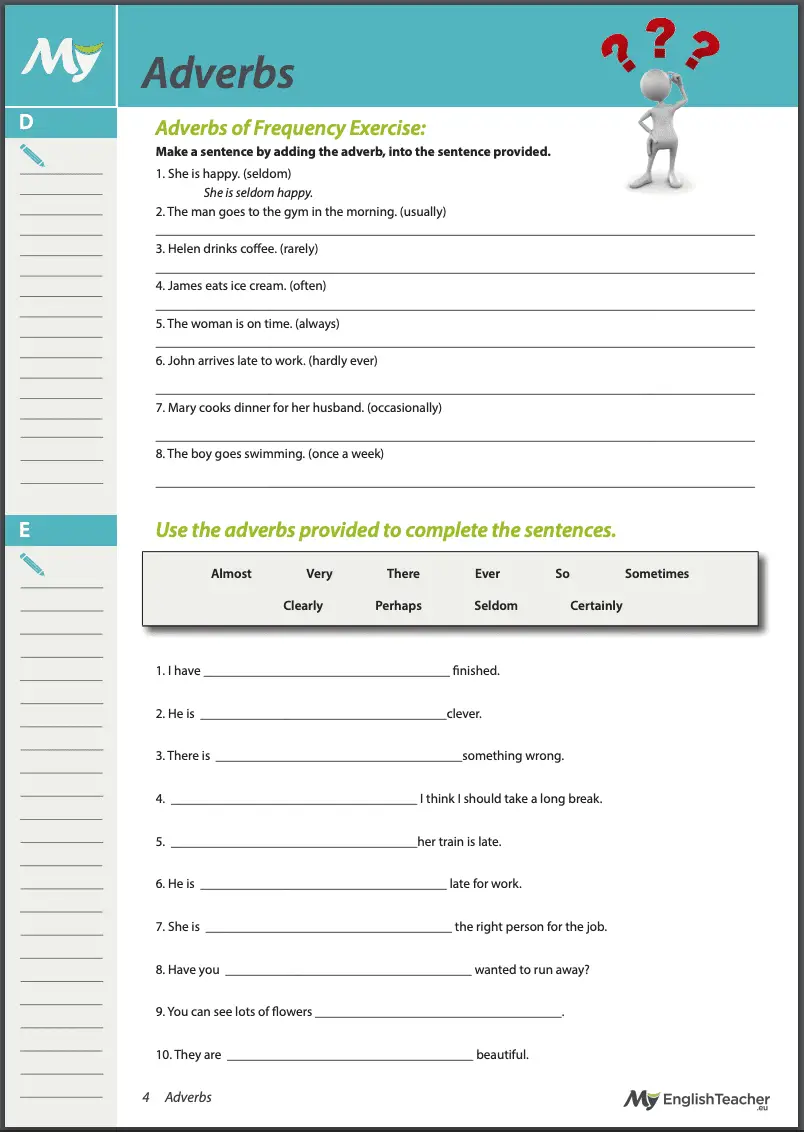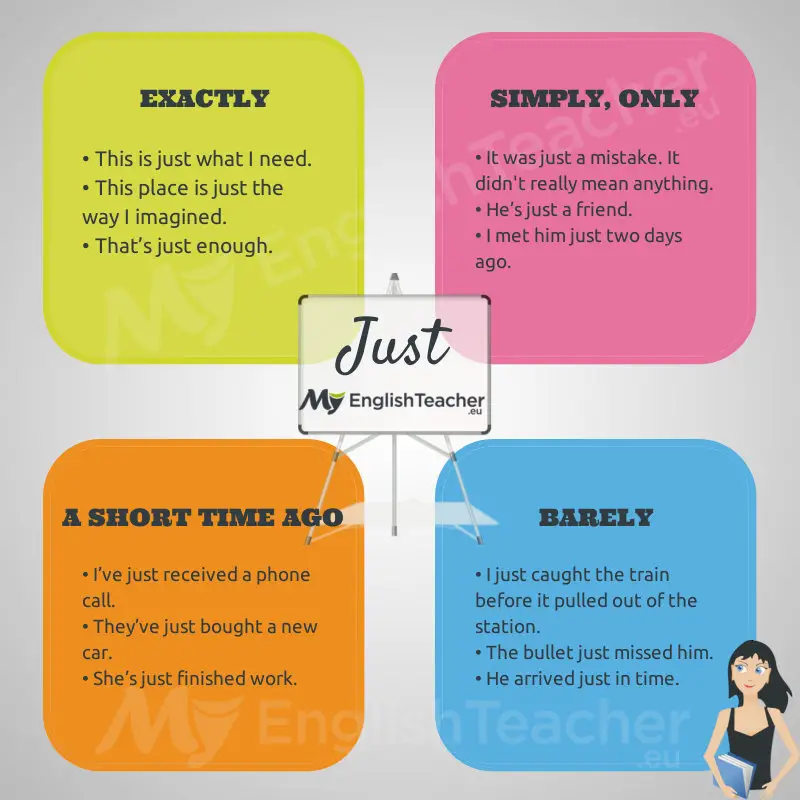What is an Adverb?
An adverb is a word that is used to change, modify or qualify several types of words including an adjective, a verb, a clause, another adverb, or any other type of word or phrase, with the exception of determiners and adjectives, that directly modify nouns. A good way to understand adverbs is to think about them as the words that provide context. Specifically, adverbs provide a description of how, where, when, in what manner and to what extent something is done or happens. Normally, we can spot an adverb by the fact that it often ends in –ly, but there are lots of adverbs that don’t end in this way. Moreover, adverbs can be used in many combinations with each other.
Traditionally considered a single part of speech, adverbs perform a wide variety of functions, making it difficult to treat them as a single, unified category. However, spotting an adverb, especially one that ends in -ly is easy. Adverbs normally help paint a fuller picture by describing how something happens, such as
- When? She always arrives early.
- How? He drives carefully.
- Where? They go everywhere together.
- In what way? She eats slowly.
- To what extent? It is terribly hot.
This function of providing more information about how something is done is called the adverbial function, and it may be accomplished by using adverbial clauses and adverbial phrases as well as by adverbs that stand alone.
There are many rules for using adverbs, and these rules often depend upon which type of adverb you are using. Remember these basics and using adverbs to make sentences more meaningful will be easier for you.
- Adverbs can always be used to modify verbs. Notice that the second of these two sentences is much more interesting simply because it contains an adverb:
- The dog ran. (You can picture a dog running, but you don’t really know much more about the scene.)
- The dog ran excitedly. (You can picture a dog running, wagging its tail, panting happily, and looking glad to see its owner. You can paint a much more interesting picture in your head when you know how or why the dog is running.)
- Adverbs are often formed by adding the letters “-ly” to adjectives. This makes it very easy to identify adverbs in sentences. There are many exceptions to this rule; everywhere, nowhere, and upstairs are a few examples.
- An adverb can be used to modify an adjective and intensify the meaning it conveys. For example:
- My math teacher is incredibly patient.
- This movie is more interesting than the first one.
As you read the following adverb examples, you’ll notice how these useful words modify other words and phrases by providing information about the place, time, manner, certainty, frequency, or other circumstances of activity denoted by the verbs or verb phrases in the sentences.
Types of Adverbs
Adverbs of Manner
An adverb of manner will explain how an action is carried out. Very often adverbs of manner are adjectives with -ly added to the end, but this is certainly not always the case. In fact, some adverbs of manner will have the same spelling as the adjective form.
Some examples of adverbs of manner include:
- Slowly
- Rapidly
- Clumsily
- Badly
- Diligently
- Sweetly
- Warmly
- Sadly
Adverb of manner examples in the following sentences are in bold for easy identification.
- She passed the exam easily.
- They walk quickly to catch the train.
- The dinner party went badly.
- John answered the question correctly.
Notice how the adverbs are formed by adding -ly to the adjectives bad, correct and quick, although there is a slight spelling change when forming an adverb with the adjective easy.
As mentioned, some adverbs of manner take the same spelling as the adjective and never add an -ly to the end:
- The boys had worked hard.
- The car drives
- Julia dances well.
Adverbs of place
An adverb of place, sometimes called spatial adverbs, will help explain where an action happens. Adverbs of place will be associated with the action of the verb in a sentence, providing context for direction, distance and position: southeast, everywhere, up, left, close by, back, inside, around. These terms don’t usually end in -ly.
Adverbs of place examples in the following sentences are in bold for easy identification.
Directions
- New York is located north of Philadelphia.
- They traveled down the mountainside.
- First, I looked here, and then I looked there, but I can’t find them anywhere.
Notice that here and there are often used at the beginning of a sentence to express emphasis or in exclamation.
- Here comes the sun.
- There is love in the air.
- Here you are!
Many times, adverbs of place can be used as prepositions as well. The difference is, when the phrase is used as an adverb, it is modifying a verb; when it is used as a preposition, it is always followed by a noun.
- New York is located north of Philadelphia -> New York is on the map.
- They travelled down river -> They travelled in the first compartment.
- That puppy was walking around by itself-> We put a collar around its neck.
Distance
- There was a deli
- Jane is moving far away.
- Carly is sitting close to me.
Position
- The treasure lies underneath the box.
- The cat is sleeping on the bed.
- Why are you standing in the middle of the dancefloor?
In addition, some adverbs of position will refer to a direction of movement. These often end in -ward or -wards.
- Oscar travelled onward to Los Angeles.
- Hannah looked upwards to the heavens.
- Molly, move forward to the front of the queue, please.
Adverbs of Frequency
Adverbs of frequency are used to express time or how often something occurs. Adverbs of frequency can be split two main groups. The first, adverbs of indefinite frequency, are terms that have an unclear meaning as to how long are how often something occurs: usually, always, normally. These adverbs will usually be placed after the main verb or between the auxiliary verb and infinitive.
Adverbs of frequency examples in the following sentences are in bold for easy identification.
- The adverb is usually placed before the main verb.
- I can normally make the shot.
- I will always love
Adverbs of definite frequency will usually be placed at the end of the sentence.
- We get paid hourly.
- I come here
- The situation seems to change monthly.
- The newspaper is bought daily.
Adverbs of Time
Adverbs of time, while seemingly similar to adverbs of frequency, tell us when something happens. Adverbs of time are usually placed at the end of a sentence.
Adverbs of time examples in the following sentences are in bold for easy identification.
- I will see you
- Harvey forgot his lunch yesterday and again today.
- I have to go now.
- We first met Julie last year.
While it’s almost always correct to have the adverb of time at the end of the sentence, you can place it at the start of the sentence to put a different emphasis on the time if it is important to the context.
- Last year was the worst year of my life.
- Tomorrow our fate will be sealed.
- Yesterday my troubles seemed so far away.
Adverbs of Purpose
Adverbs of purpose, sometimes called adverbs of reason, help to describe why something happened. They can come in the form of individual words – so, since, thus, because – but also clauses – so that, in order to. Notice in the examples that the adverbs of purpose are used to connect sentences that wouldn’t make sense if they were formed alone.
Adverbs of purpose examples in the following sentences are in bold for easy identification.
- I was sick, thus didn’t go to work today.
- I started jogging so that I wouldn’t be late.
- Because I was late, I jogged a little faster.
- Since it’s your birthday, I will buy you a gift.
Positions of Adverbs
The positions of adverbs are not a fixed or set thing. As you have seen, adverbs can appear in different position in a sentence. However, there are some rules that help us decide where an adverb should be positioned. The rules will be different depending on whether the adverb is acting to modify an adjective or another adverb, a verb or what type of adverb it is.
Positional adverb examples in the following sentences are in bold for easy identification.
Adverb position with adjectives and other adverbs
These adverbs will usually be placed before the adjective or adverb being modified:
- We gave them a really tough match. The adverb really modifies the adjective tough.
- It was quite windy that night. The adverb quite modifies the adjective windy.
- We don’t go to the movies terribly often. The adverb terribly modifies the adverb often.
Adverb position with verbs
This can be a bit trickier because, it will depend on the type of adverb – place, position, time etc. – and there are many exceptions to the rules. However, a basic set of guidelines is shown below:
Adverbs of manner or place are usually positioned at the end of the sentence:
- She laughed timidly.
- I stroked the cat gently.
- Janine lived here.
- There is money everywhere.
As mentioned, if the adverb is of definite time it will be placed at the end of the sentence.
- I did it yesterday.
- We can discuss it tomorrow.
- Let’s go to Paris next week.
However, if it is an indefinite period of time, it will go between the subject and main verb.
- We often go to Paris in the springtime.
- Debbie regularly swims here.
- Bobby and Audrey always loved fishing by the lake.
Order of Adverbs
Adverb order is so important it has clear rules. It’s already mentioned that some adverbs will act to modify another, but how do you decide the structure of a sentence with several adverbs? Thankfully, there is a simple set of rules to follow, called the order of adverbs. Handily, the order of adverbs, sometimes also called the royal order of adverbs, can help us determine sentence structure too. In short, the adverbs get preference (are placed first) in the following order:
- Adverbs of manner.
- Adverbs of place.
- Adverbs of frequency.
- Adverbs of time.
- Adverbs of purpose.
Consider this sentence:
I run (verb) quickly (manner) down the road (place) every morning (frequency) before school (time) because (purpose) I might miss the bus.
While it is good to remember the order of adverbs, there is always flexibility with language, and we have already mentioned that adverbs of time and frequency can be placed at the start of a sentence to change the emphasis. So, bottom line: think of the order of adverbs as more of a guideline than a rule that can’t be broken.
Examples of Adverbs
As you read each of the following adverb examples, note that the adverbs have been italicized for easy identification. Consider how replacing the existing adverbs with different ones would change the meaning of each sentence.
- She was walking rapidly.
- The kids love playing together in the sandbox.
- Please come inside now.
- His jokes are always very
- You don’t really care, do you?
Adverbs Exercises
The following exercises will help you gain greater understanding about how adverbs work. Choose the best answer to complete each sentence.
- The driver stopped the bus _______________.
A. Financially
B. Exactly
C. Abruptly
D. Now
Answer: C. The driver stopped the bus abruptly.
- During autumn, colorful leaves can be seen falling ______________ from trees.
A. Everywhere
B. Very
C. Gently
D. Loudly
Answer: C. During autumn, colorful leaves can be seen falling gently from trees.
- My grandmother always smiled _______________.
A. Cheerfully
B. Sadly
C. Never
D. Yesterday
Answer: A. My grandmother always smiled cheerfully.
- After the party, confetti was strewn _________________.
A. Blandly
B. Everywhere
C. Later
D. Carefully
Answer: B. After the party, confetti was strewn everywhere.
- It’s time to go ____________.
A. Before
B. Now
C. Yesterday
D. Lightly
Answer: B. It’s time to go now.
Adverbs List
There are many different words that function as adverbs. The following list is broken down into segments which list adverbs by function. After reading, you will be able to think of additional adverbs to add to your own list – after all, there are thousands.
Many adverbs end in “-ly”. This makes it very easy to spot the adverbs in most sentences.
Abruptly
Boldly
Carefully
Deliberately
Excitedly
Financially
Horribly
Mildly
Naughtily
Openly
Poorly
Quickly
Sadly
Terribly
Willingly
Yearly
Some adverbs tell us where the action happened. These are known as adverbs of place.
Everywhere
Here
Inside
There
Underground
Upstairs
Certain adverbs let us know when or how often the action happened. These are known as adverbs of time and adverbs of frequency.
After
Always
Before
Later
Now
Today
Yesterday
Many adverbs tell us the extent of the action.
Almost
Enough
So
Too
Quite
Rather
Very
Some adverbs are used as intensifiers.
Absolutely
Certain
Completely
Heartily
Really
Certain adverbs called adverbs of manner tell us about the way in which something was done.
Briskly
Cheerfully
Expectantly
Randomly
Willingly
Some groups of words serve the same functions as adverbs. These are known as adverb clauses. Be sure to read the adverb clause section to learn new ways to make your sentences even more interesting.
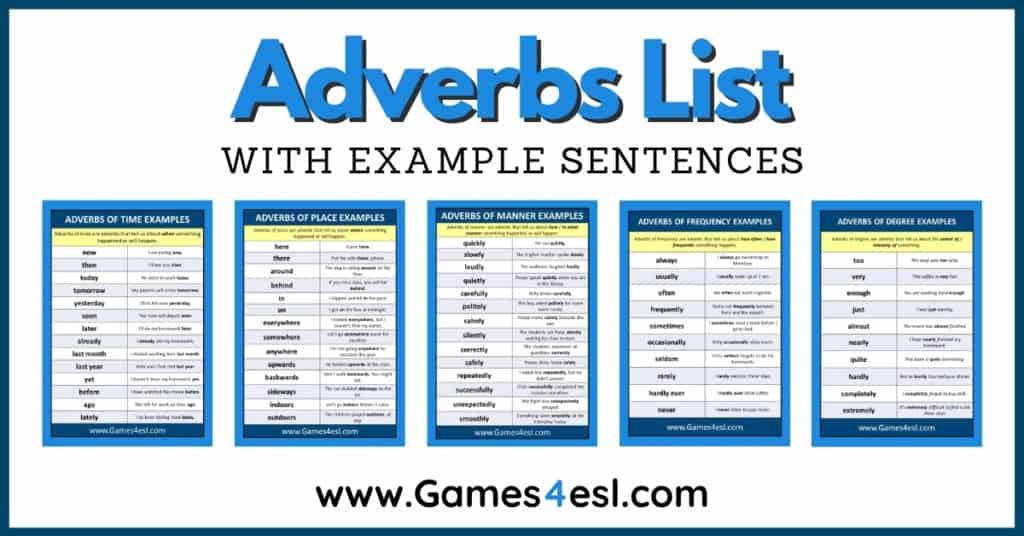
Adverbs can be difficult for English language students to learn because of the different types and functions that adverbs have. However, by looking at many adverb examples, English language learners can greatly improve their English language ability. They will be able to describe more accurately how, when, and where an action happened and will be able to describe to what extent, and how often they happen. Below, you can find many adverb examples and adverb example sentences. But first, let’s take a look at what exactly an adverb is.
What Is An Adverb?
An adverb is a word that modifies other words, such as verbs and adjectives. Adverbs can also modify other adverbs. The way in which an adverb modifies another word depends on the type of adverb it is. There are five main types of adverbs. These are adverbs of time, adverbs of place, adverbs of manner, adverbs of frequency, and adverbs of degree.
The functions of each of these types adverbs are as follows:
- Adverbs of Time – These describe when something happens.
- Adverbs of Place – These describe where something happens.
- Adverbs of Manner – These describe how something happens.
- Adverbs of Frequency – These describe how often something happens.
- Adverbs of Degree – These describe to what extent something happens.
Let’s take a look at some adverb examples. Below, you will find many examples of adverbs along with printable PDFs of adverb examples that you can download.
Adverbs Of Time Examples
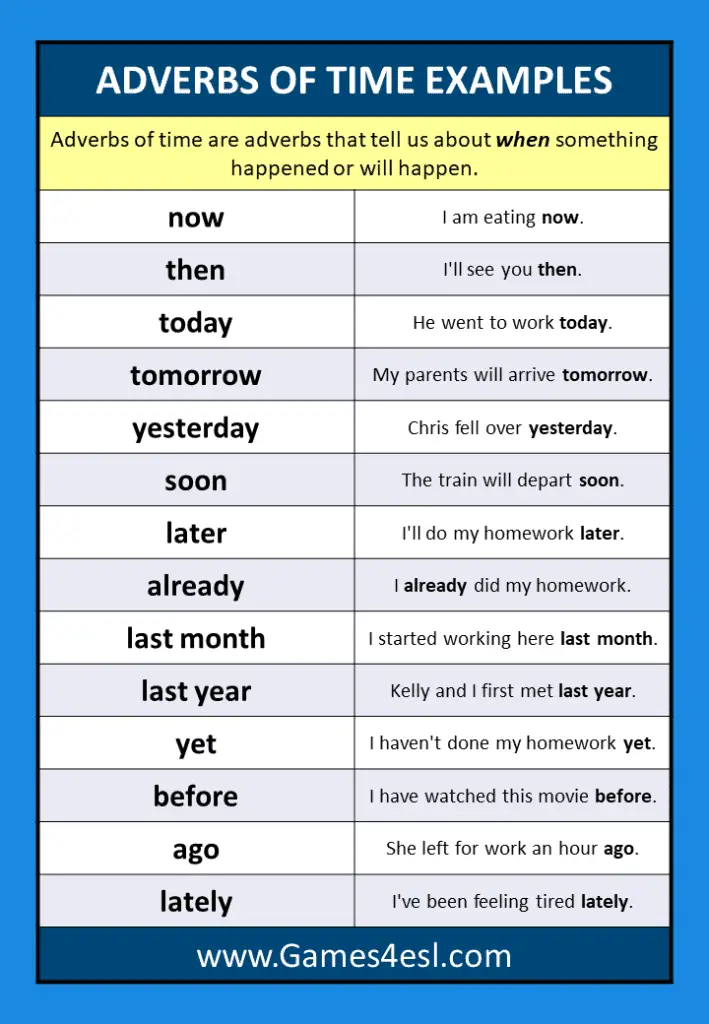
Adverbs of time are adverbs that tell us about when something happened or will happen. Here is a list of common adverbs of time with example sentences. Click here to download this list as a PDF.
- now – I am eating now.
- then – I’ll see you then.
- today – He went to work today.
- tomorrow – My parents will arrive tomorrow.
- yesterday – Chris fell over yesterday.
- soon – The train will depart soon.
- later – I’ll do my homework later.
- already – I already did my homework.
- last month – I started working here last month.
- last year – Kelly and I first met last year.
- yet – I haven’t done my homework yet.
- before – I have watched this movie before.
- ago – She left for work an hour ago.
- lately – I’ve been feeling tired lately.
Adverbs Of Place Examples
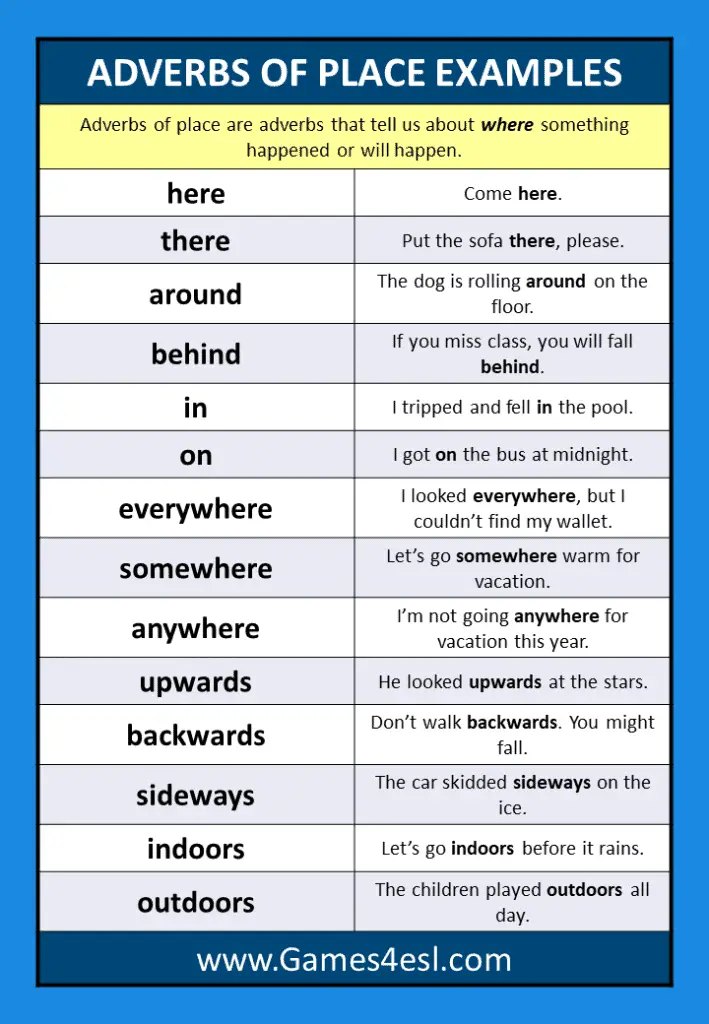
Adverbs of place are adverbs that tell us about where something happened or will happen. Here is a list of common adverbs of place with example sentences. Click here to download this list as a PDF.
- here – Come here.
- there – Put the sofa there, please.
- around – The dog is rolling around on the floor.
- behind – If you miss a class you will fall behind.
- in – I tripped and fell in the swimming pool.
- on – I got on the bus at midnight.
- off – He just drove off.
- over – I almost tripped over on the way here.
- somewhere – Let’s go somewhere warm for vacation.
- nowhere – We went nowhere for vacation last year.
- everywhere – I looked everywhere but couldn’t find my wallet.
- anywhere – I’m not going anywhere for vacation this year.
- upwards – He looked upwards at the stars.
- downwards – The path sloped downwards towards the stream.
- backwards – Don’t walk backwards. You might fall.
- sideways – The car skidded sideways on the ice.
- indoors – Let’s go indoors before it rains.
- outdoors – The children played outdoors all day.
Adverbs Of Manner Examples
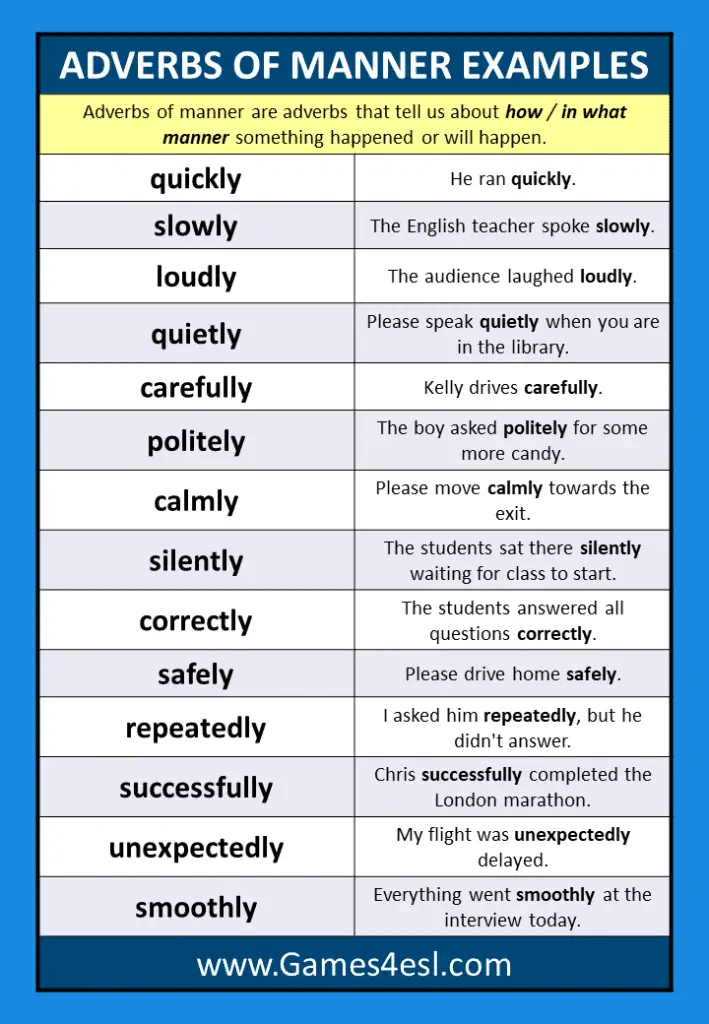
Adverbs of manner are adverbs that tell us about how / in what manner something happened or will happen. Most adverbs of manner end in -ly. Here is a list of common adverbs of manner with example sentences. Click here to download this list as a PDF.
- quickly – He ran quickly.
- slowly – The English teacher spoke slowly so that I could understand.
- angrily – She reacted angrily when she found out.
- calmly – Please move calmly towards the exit.
- carefully – Kelly drives carefully.
- correctly – The students answered all questions correctly.
- loudly – The audience laughed loudly.
- quietly – Please speak quietly when you are in the library.
- politely – The boy asked politely for some more candy.
- seriously – I was seriously hurt in a car crash.
- silently – The students sat there silently waiting for class to start.
- successfully – Chris successfully completed the London marathon.
- unexpectedly – My flight was unexpectedly delayed.
- wisely – Please choose your essay topic wisely.
- suspiciously – He was carrying a suspiciously large amount of money.
- smoothly – Everything went smoothly at the interview today.
- safely – Please drive home safely.
- repeatedly – I asked him repeatedly, but he didn’t answer.
Adverbs Of Frequency Examples
Adverbs of frequency are adverbs that tell us how often or how frequently something happens. Here is a list of adverbs of frequency with example sentences. Click here to download this list as a PDF.
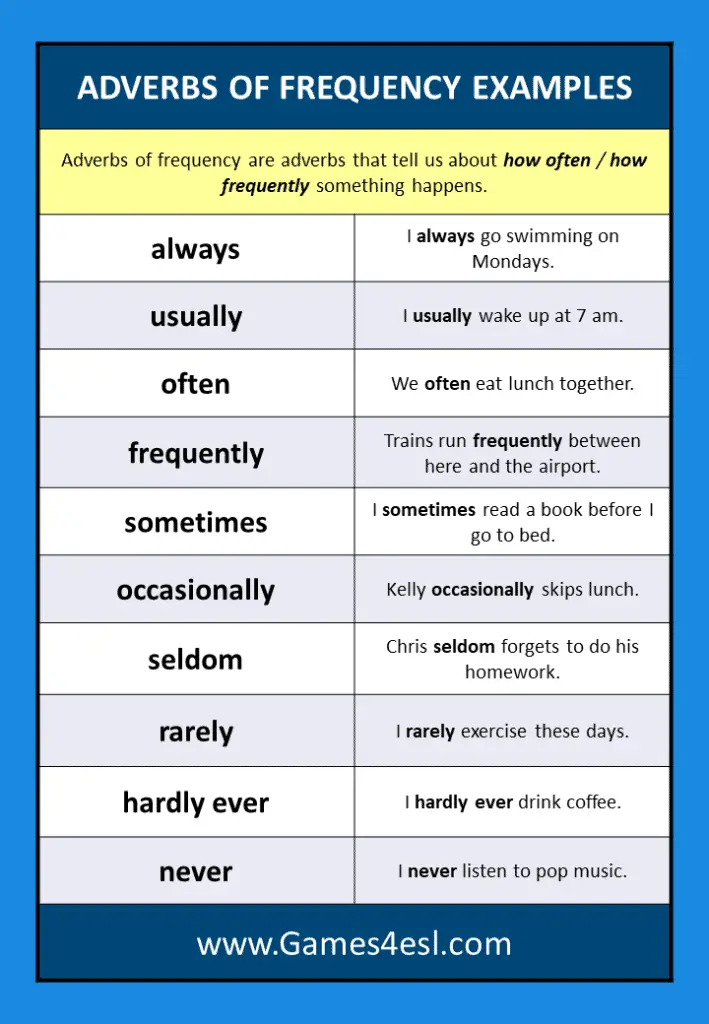
- always – I always go swimming on Mondays.
- usually – I usually wake up at 7 am.
- often – We often eat lunch together.
- frequently – Trains run frequently between here and the airport.
- sometimes – I sometimes read a book before I go to bed.
- occasionally – Kelly occasionally skips lunch.
- seldom – Chris seldom forgets to do his homework.
- rarely – I rarely exercise these days.
- hardly ever – I hardly ever drink coffee.
- never – I never listen to pop music.
Adverbs Of Degree Examples
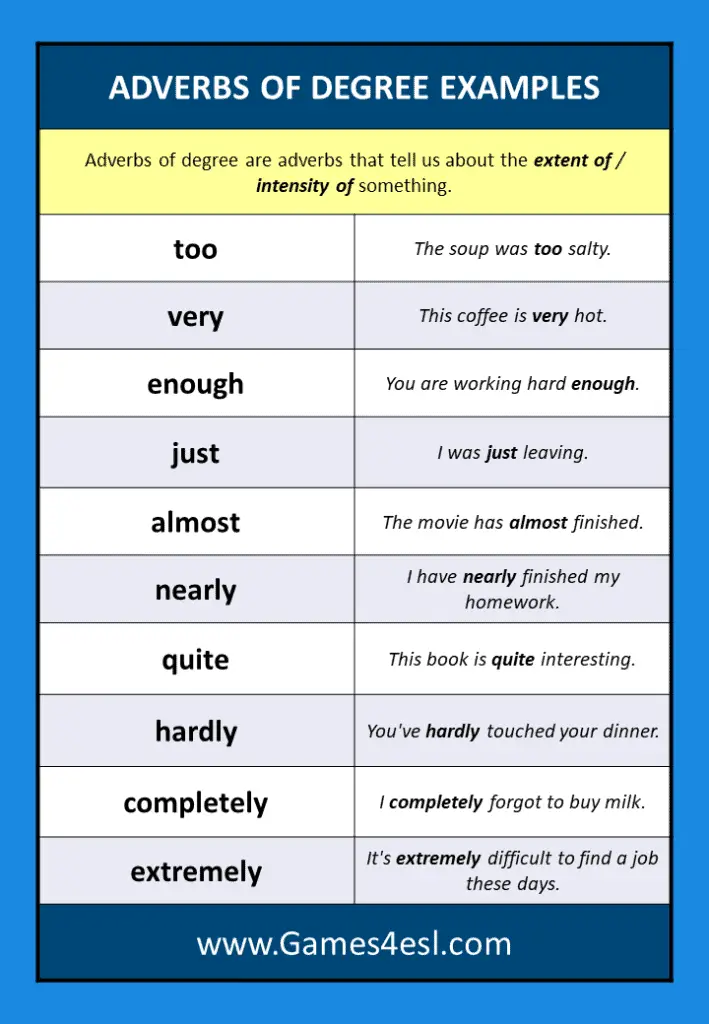
Adverbs of degree are adverbs which tell us about the extent of or the intensity of something. Click here to download this adverbs list as a PDF.
- too – The soup was too salty.
- very – This coffee is very hot.
- enough – You are working hard enough.
- just – I was just leaving.
- almost – The movie has almost finished.
- nearly – I have nearly finished my homework.
- quite – This book is quite interesting.
- hardly – You’ve hardly touched your dinner.
- completely – I completely forgot to buy milk.
- extremely – It’s extremely difficult to find a job these days.
Related Resources
Thanks for reading. I hope you found this list of adverbs with examples useful. Before you go, be sure to check out these related resources that you may find useful:
Adverbs Lesson Plan
Adverbs Of Frequency Game
Adverbs quiz
List of Adverbs! This page provides a full list of adverbs from A to Z in English with ESL pictures. They have been chosen especially for ESL learners.
Learn 300+ adverb examples in English.
List of Adverbs (A-H)
- Abnormally
- Absentmindedly
- Accidentally
- Actually
- Adventurously
- Afterward
- Almost
- Always
- Annually
- Anxiously
- Arrogantly
- Awkwardly
- Bashfully
- Beautifully
- Bitterly
- Bleakly
- Blindly
- Blissfully
- Boastfully
- Boldly
- Bravely
- Briefly
- Brightly
- Briskly
- Broadly
- Busily
- Calmly
- Carefully
- Carelessly
- Cautiously
- Certainly
- Cheerfully
- Clearly
- Cleverly
- Closely
- Coaxingly
- Colorfully
- Commonly
- Continually
- Coolly
- Correctly
- Courageously
- Crossly
- Cruelly
- Curiously
- Daily
- Daintily
- Dearly
- Deceivingly
- Deeply
- Defiantly
- Deliberately
- Delightfully
- Diligently
- Dimly
- Doubtfully
- Dreamily
- Easily
- Elegantly
- Energetically
- Enormously
- Enthusiastically
- Equally
- Especially
- Even
- Evenly
- Eventually
- Exactly
- Excitedly
- Extremely
- Fairly
- Faithfully
- Famously
- Far
- Fast
- Fatally
- Ferociously
- Fervently
- Fiercely
- Fondly
- Foolishly
- Fortunately
- Frankly
- Frantically
- Freely
- Frenetically
- Frightfully
- Fully
- Furiously
- Generally
- Generously
- Gently
- Gladly
- Gleefully
- Gracefully
- Gratefully
- Greatly
- Greedily
- Happily
- Hastily
- Healthily
- Heavily
- Helpfully
- Helplessly
- Highly
- Honestly
- Hopelessly
- Hourly
- Hungrily
List of Adverbs (I-P)
- Immediately
- Innocently
- Inquisitively
- Instantly
- Intensely
- Intently
- Interestingly
- Inwardly
- Irritably
- Jaggedly
- Jealously
- Jovially
- Joyfully
- Joyously
- Jubilantly
- Judgmentally
- Justly
- Keenly
- Kiddingly
- Kindheartedly
- Kindly
- Knavishly
- Knowingly
- Knowledgeably
- Kookily
- Lazily
- Less
- Lightly
- Likely
- Limply
- Lively
- Loftily
- Longingly
- Loosely
- Loudly
- Lovingly
- Loyally
- Madly
- Majestically
- Meaningfully
- Mechanically
- Merrily
- Miserably
- Mockingly
- Monthly
- More
- Mortally
- Mostly
- Mysteriously
- Naturally
- Madly
- Majestically
- Meaningfully
- Mechanically
- Merrily
- Miserably
- Mockingly
- Monthly
- More
- Mortally
- Mostly
- Mysteriously
- Nearly
- Neatly
- Nervously
- Never
- Nicely
- Noisily
- Not
- Obediently
- Obnoxiously
- Oddly
- Offensively
- Officially
- Often
- Only
- Openly
- Optimistically
- Overconfidently
- Painfully
- Partially
- Patiently
- Perfectly
- Physically
- Playfully
- Politely
- Poorly
- Positively
- Potentially
- Powerfully
- Promptly
- Properly
- Punctually
List of Adverbs (Q-Z)
- Quaintly
- Queasily
- Queerly
- Questionably
- Quicker
- Quickly
- Quietly
- Quirkily
- Quizzically
- Randomly
- Rapidly
- Rarely
- Readily
- Really
- Reassuringly
- Recklessly
- Regularly
- Reluctantly
- Repeatedly
- Reproachfully
- Restfully
- Righteously
- Rightfully
- Rigidly
- Roughly
- Rudely
- Safely
- Scarcely
- Scarily
- Searchingly
- Sedately
- Seemingly
- Seldom
- Selfishly
- Separately
- Seriously
- Shakily
- Sharply
- Sheepishly
- Shrilly
- Shyly
- Silently
- Sleepily
- Slowly
- Smoothly
- Softly
- Solemnly
- Solidly
- Sometimes
- Soon
- Speedily
- Stealthily
- Sternly
- Strictly
- Successfully
- Suddenly
- Supposedly
- Surprisingly
- Suspiciously
- Sweetly
- Swiftly
- Sympathetically
- Tenderly
- Tensely
- Terribly
- Thankfully
- Thoroughly
- Thoughtfully
- Tightly
- Tomorrow
- Too
- Tremendously
- Triumphantly
- Truly
- Truthfully
- Ultimately
- Unabashedly
- Unaccountably
- Unbearably
- Unethically
- Unexpectedly
- Unfortunately
- Unimpressively
- Unnaturally
- Unnecessarily
- Upbeat
- Upright
- Upside-down
- Upward
- Urgently
- Usefully
- Uselessly
- Usually
- Utterly
- Vacantly
- Vaguely
- Vainly
- Valiantly
- Vastly
- Verbally
- Very
- Viciously
- Victoriously
- Violently
- Vivaciously
- Voluntarily
- Warmly
- Weakly
- Wearily
- Well
- Wetly
- Wholly
- Wildly
- Willfully
- Wisely
- Woefully
- Wonderfully
- Worriedly
- Wrongly
- Yawningly
- Yearly
- Yearningly
- Yesterday
- Yieldingly
- Youthfully
- Zealously
- Zestfully
- Zestily
Adverbs List | Infographic
Adverbs List | Image 1
Adverbs List | Image 2
Adverbs Examples| Image 3
Adverbs Examples| Image 4
Adverbs List | Image 5
Adverbs are an important part of sentences that describe and modify other parts of the sentence. Verbs are words that describe an action, and adverbs provide description and details regarding that action. There are different types of adverbs and how we use them depends on what you’re describing, and how you want to describe it. This adverbs list has over 100 adverb examples, and they are categorized by type with adverb examples sentences in order to help you understand their uses and meanings.
What Is an Adverb? What Do Adverb Words Do?
An adverb is a word that is used to change, modify, or qualify other words. Think of adverbs as the descriptions of how, where, and when things are occurring.
You may be familiar with adverbs as words that end in «ly» that modify verbs, but that’s not always the case. There are actually five types of adverb words, and adverbs can also modify adjectives, clauses, or any other type of verb or phrase. However, adverbs can’t modify nouns and noun phrases, since they are modified by adjectives.
The 5 Types of Adverbs
There are five types of adverbs — they’re listed below with examples to help you understand the differences between them.
Adverbs of Degree: Adverbs of degree describe the intensity of a verb, or to what degree. They can also modify an adjective.
- Example: This will hardly be enough food for everyone.
Adverbs of Frequency: Adverbs of frequency let us know how often a verb occurs.
- Example: She always goes to the store on Mondays.
Adverbs of Manner: Adverbs of manner let us know the manner, or in what way, the verb is carried out. These verbs are the ones that typically end in “ly.”
- Example: She waited patiently in line.
Adverbs of Place: Adverbs of place tell is where the verb took place. These usually appear after the noun or direct object.
- Example: I’ve been seeing these new games everywhere.
Adverbs of Time: Adverbs of time detail when a verb takes place. They usually appear at the end of a phrase or sentence.
- Example: The town hosts this festival annually.
Adverb Examples
These adverb lists are sorted into the five different types for quick reference. This list is not a complete list of adverbs, but it will help you understand how to use and recognize adverb words. This adverb list provides adverb examples, as well as adverb examples sentences.
List of Adverbs of Degree
| Almost | They almost got there on time. |
| Absolutely | If you absolutely insist on driving yourself, let me at least give you directions. |
| Barely | The umbrella barely covers us both. |
| Completely | They completely shut down the ride. |
| Decidedly | The group decidedly hated the look of the presentation. |
| Deeply | I know they care very deeply about animal welfare. |
| Enough | Is it warm enough outside for sandals? |
| Enormously | Her test scores have improved enormously. |
| Extremely | The students worked extremely hard on this project. |
| Hardly | There’s hardly enough room for all of us. |
| Fairly | He was fairly new to the team but made great contributions. |
| Fully | She fully intends to spend her free time studying this weekend. |
| Incredibly | He is an incredibly talented musician. |
| Intensely | The dog stared at me intensely hoping for some food. |
| Least | I at least have to eat dinner before the movie. |
| Little | He was a little agitated by the traffic. |
| Just | I was just wondering if you’d finished the report. |
| Most | I’m most interested in studying biology. |
| Nearly | Her SAT scores were nearly perfect. |
| Perfectly | The students sat perfectly still while they waited for class to begin. |
| Positively | I am positively thrilled that it’s almost fall. |
| Practically | She practically jumped from happiness. |
| Purely | We’re analyzing this paper purely from an academic point of view. |
| Quite | This spaghetti is quite delicious. |
| Scarcely | The scientists had scarcely enough evidence to draw a conclusion. |
| Simply | I am simply stating the facts. |
| So | I am so curious about how memory works. |
| Rather | She is rather funny. |
| Really | He is really supportive of her goals. |
| Too | I’m too excited about our upcoming trip to sleep. |
| Totally | We’re totally going to the festival this weekend. |
| Thoroughly | Please make sure to read the chapter thoroughly. |
List of Adverbs of Frequency
| Again | Don’t ask again if we’re there yet. |
| Always | Always remember to pack your passport if you are traveling out of the country. |
| Never | Never underestimate your opponents in a competition. |
| Normally | He normally takes the bus to school but on nice days will ride a bike. |
| Generally | Going to the gym every day generally helps build muscle. |
| Rarely | We rarely get to see our family on the West Coast. |
| Seldom | We seldom get a day without rain in central Florida. |
| Often | I often think about the future. |
| Occasionally | We occasionally go out for a nice dinner. |
| Sometimes | They sometimes participate in the school play. |
| Usually |
I usually ask a lot of questions in class. |
List of Adverbs of Manner
| Angrily | She slammed the book shut angrily. |
| Anxiously | He waited anxiously for the train. |
| Beautifully | She sang the verse beautifully. |
| Badly | She twisted her ankle badly in the tennis match. |
| Carefully | They carefully glued the vase back together. |
| Calmly | She stated the instructions calmly. |
| Closely | I watched the baseball game closely. |
| Cheerfully | He smiled cheerfully. |
| Cautiously | Cross the road cautiously. |
| Clearly | I can see clearly after Lasik surgery. |
| Correctly | I guessed correctly on my first try. |
| Deliberately | She chose her extracurriculars deliberately. |
| Eagerly | He waited eagerly for the results of his SATs. |
| Enthusiastically | The students responded enthusiastically to the idea of a field trip. |
| Excitedly | She excitedly announced her new job online. |
| Dangerously | They came dangerously close to encountering a bear on their hike. |
| Generously | The volunteer generously coordinated the schedules of the other volunteers. |
| Kindly | They always treat each other kindly. |
| Fondly | The mom fondly watched her kids play in the snow. |
| Frankly | They discussed the marketing strategy frankly. |
| Easily | She is easily the funniest person I know. |
| Loudly | She called loudly across the room to her friend. |
| Gently | I placed the new houseplant gently on the ground. |
| Greedily | She greedily grabbed all the free things she could at the event. |
| Happily | The danced happily across the room. |
| Hurriedly | She walked hurriedly to her next class. |
| Hungrily | He hadn’t eaten all day, and hungrily wolfed down the pizza. |
| Innocently | He was walking by innocently when someone dropped a water balloon from above. |
| Inquisitively | The students looked inquisitively through their microscopes. |
| Mysteriously | The photo disappeared mysteriously from my bookshelf. |
| Naturally | The boy’s voice is naturally loud. |
| Neatly | He put his books neatly back on the shelf. |
| Nervously | She waited nervously for his ACT scores. |
| Noisily | I noisily stumbled through the apartment in the dark. |
| Patiently | The dog waited patiently for a treat. |
| Politely | He asked politely for more popcorn |
| Repeatedly | The teacher asked repeatedly for the students to put their phones on silent. |
| Safely | She was relieved to be safely back on the ground after the turbulent plane ride. |
| Suddenly | He suddenly stopped in his tracks. |
| Slowly | Close the door slowly because otherwise it will creak. |
| Softly | She spoke softly on the phone so she didn’t disturb her colleagues. |
| Secretly | They were behaving so secretly that I knew they were up to something. |
| Suspiciously | He regarded the new student suspiciously. |
| Quickly | She walked as quickly as she could through the crowded square. |
| Quietly | He spoke quietly during the meeting and was asked to speak up. |
| Well | I think I did well on the quiz today. |
List of Adverbs of Place
| Above | The plane flew above the clouds. |
| Around | She turned around to look for the source of the noise. |
| Back | Turn back if the trail gets too difficult. |
| Backward | Count backward from ten if you get angry. |
| Below |
Check below the sink for the saucepan. |
| Everywhere |
They searched everywhere for her keys. |
| Here |
I live here in the city. |
| Into |
We’ll go into the woods to find the hiking trail. |
| Nearby |
She’s planning to stay nearby for college. |
| Nowhere |
His files were nowhere to be found. |
| Out |
We went out into the garden. |
| Outside |
Take your boots outside. |
| There |
Put your bag there. |
| Upward |
The birds flew upwards to a higher branch. |
| Westward | Drive westward on route 80. |
List of Adverbs of Time
| Sometime | We should see that movie sometime. |
| Later | I’ll take out the trash later. |
| Annually | They host the Halloween party annually. |
| Daily | I read the newspaper daily. |
| Monthly | The magazine is printed monthly. |
| Recently | She visited her parents recently. |
| Tomorrow | I will go to the store tomorrow. |
| Only | She only checks her email weekly. |
| Yearly | They go on this trip yearly. |
| Yesterday | I moved the car yesterday. |
| Now | The baby wants to eat right now. |
| Yet | The meeting had started but we hadn’t even left yet. |
Now that you’re familiar with adverbs from our adverb lists, think carefully about how they work within a sentence. Adverbs are wonderful, but they should be used sparingly. A strong verb or adjective can be even better for your writing than an adverb. You don’t want your writing to be saturated in adverbs examples. Instead, they should be brought out like secret weapons to enhance imagery, emphasize important actions, and clarify complex themes in your writing. And when you’re stuck, you can always reference this list of adverbs examples.
What’s Next?
Looking for more writing help and advice? Check out this list of The 20 Most Useful Rhetorical Devices and 122 Tone Words to Set the Mood in Your Story. And don’t miss these guides on assonance and imagery!
For help with grammar in your test prep, read up on The Complete Guide to SAT Grammar Rules and the must-know ACT grammar rules.
Need more help with this topic? Check out Tutorbase!
Our vetted tutor database includes a range of experienced educators who can help you polish an essay for English or explain how derivatives work for Calculus. You can use dozens of filters and search criteria to find the perfect person for your needs.
Have friends who also need help with test prep? Share this article!
Carrie holds a Bachelors in Writing, Literature, and Publishing from Emerson College, and is currently pursuing an MFA. She worked in book publishing for several years, and believes that books can open up new worlds. She loves reading, the outdoors, and learning about new things.
Данная статья посвящена наречиям английского языка. Эта тема раскрывает все вопросы, которые могут интересовать человека, изучающего грамматические правила. Мы узнаем, как образовать наречия, сравним их с прилагательными, а также где они стоят в предложении. Кроме этого, пополним словарный запас некоторыми выражениями и научимся работать с degrees of comparison of adverbs. И конечно же, всегда после материла, вы сможете проверить знания на пройденную тему.
Статьи, которые могут быть полезными:
1. Исчисляемые и неисчисляемые существительные.
2. Притяжательный падеж и устойчивые фразы.
3. Подробная таблица времен.
4. Too and enough
5. Степень сравнения прилагательных.
Что такое наречия в английском языке?
Наречия (adverbs) обычно описывают или определяют глаголы, прилагательные, другие наречия или целое предложение.
- Например, the adverbs в следующих предложениях выделены жирным и слова, которые они определяют подчеркнуты:
– I often visit the library. – Я часто посещаю библиотеку.
– It is surprisingly cold today. – Сегодня на удивление холодно.
В первом предложении наречие often определяет глагол visit. Во втором, слово surprisingly описывает прилагательное cold.
- Слова, которые используются для описания наречий, также могут относиться к adverbs:
– My cat eats very slowly. – Мой кот ест очень медленно.
В этом предложении наречие very определяет наречие slowly.
Образование наречий в английском языке
Многие наречия связаны с прилагательными, с помощью словообразования:
[Adjective + суффикс ly = Adverb]
- Cheap – cheaply – дешевый – дешево.
- Slow – slowly – медленный – медленно.
- Quick – quickly – быстрый – быстро.
Правила правописания
- Прилагательные, которые заканчиваются на -ic добавляем -ally:
- Tragic – tragically – трагический – трагически.
- Realistic – realistically – реалистичный – реалистично.
- Ironic – ironically – иронический – иронично.
BUT: public – publicly – публичный – публично.
- Прилагательные, которые заканчиваются на –le нужно изменить “e” на “y”:
- Horrible – horribly – ужасный – ужасно.
- Noble – nobly – благородный – благородно.
- Simple – simply – простой – просто.
- Прилагательные, заканчивающиеся на согласную + -y, мы убираем “y” и добавляем –ily:
- Happy – happily – счастливый – счастливо.
- Easy – easily – легкий – легко.
- Crazy – crazily – сумасшедший – безумно.
- Прилагательные, которые заканчиваются на -e образуют наречие с добавлением -ly не опуская букву ‘e’:
- Rare – rarely – редкий – редко.
- Polite – politely – вежливый – вежливо.
- Ну как обычно существуют исключения:
- True – truly
- Whole – wholly
- Due – dully
- Full – fully
[qsm quiz=59]
Прилагательные на суффикс -ly
Есть ряд прилагательных, заканчивающихся на -ly, которые не имеют соответствующих наречий. Такие adjectives, происходят от существительных, обозначающие:
- People:
- 1) Man – мужчина = manly – мужественный, сильный.
Example:
– A deep, manly voice. - 2) King – король = kingly – королевский.
- Family and personal relations:
- 1) Father – отец = fatherly – отцовский.
- 2) Brother = brotherly; friend = friendly.
- И другие:
Lovely – прекрасный.
Lonely – одинокий.
Silly – глупый.
Ugly – уродливый.
Lively – живой.
- Образуют наречие с помощью конструкции [in a Adj way] или [in a Adj manner]:
– They treated me in a friendly way. – Они относились ко мне по-дружески/дружелюбно.
Запомните следующие словосочетания:
| in a soldierly way | по-воинские |
| in a sickly way | болезненно |
| in a silly way | глупо |
| in a manly way | по-мужски |
| in a womanly way | по-женски |
| in a cowardly way | трусливым образом |
| in a lively way | живо |
| in a lovely way | в прекрасной манере |
| in a motherly way | по-матерински |
| in a fatherly way | по-отцовски |
| in a brotherly way | по-братски |
| in a sisterly way | по-сестрински |
| in a kingly way | по-королевски |
Наречия и прилагательные с одинаковой формой
Существует ряд adjectives / adverbs, которые имеют неизменную форму. Таким образом, это зависит от контекста, является ли слово прилагательным или наречием: Fast, hard, early, late, high, low, right, wrong, straight, daily, monthly and long etc.
- This is hard exercise. – Это упражнение сложное.
- She works hard. – Она работает усердно.
- I saw many high buildings. – Я видела много высоких зданий.
- The plane flew high in the sky. – Самолет летел высоко в небе.
Сравните:
- Walk slow! (Informal English).
- Walk slowly! (Formal English).
Good vs. Well
- Good – прилагательное.
- Well – наречие.
Examples:
- He is a good writer. – Он хороший писатель.
- He writes well. – Он пишет хорошо.
- Иногда well используется как прилагательное, когда говорится о здоровье (health):
- You’re not looking too well. Are you okay? – Ты не очень хорошо выглядишь. Ты в порядке?
Note:
После глаголов look, sound, smell, taste, feel, seem мы используем прилагательное, а не наречие:
- She looks nice /bad /pale/strange.
- It smells sweet /horrible/bad.
Наречия с двумя формами и разными значениями
Некоторые наречия имеют две формы. Первая, которая заканчивается на -ly,
вторая форма остается без изменений: clean(ly), clear(ly) etc.
Эти пары наречий обычно имеют разные значения.
Сравните:
Close or closely?
Close = near (близкий, расположенный недалеко).
– We live close to the church. – Мы живем рядом с церковью.
Closely = carefully (внимательно).
– I was watching the game closely. – Я внимательно следил за игрой.
Второе значение – тесно, близко:
– The two languages are closely related. – Два языка тесно связаны.
Dead or deadly?
Dead = suddenly and completely
– The snow stopped dead. – Снег внезапно остановился.
Deadly = very
– She is deadly serious. – Она очень серьезная.
Deep or deeply?
Deep = a long way down
– I dug deep into the ground. – Я копнул глубоко в землю.
Deeply = very
– I was deeply offended. – Я был очень оскорблен.
Free or freely?
Free = without payment
– Children travel free on buses. – Дети путешествуют бесплатно на автобусах.
Freely = willingly
– She spoke freely about her past. – Она открыто говорила о своем прошлом.
Hard or hardly?
Hard = with a lot of effort
– She worked really hard and passed her exams. – Она усердно работала и сдала экзамены.
Hardly = scarcely/only just
– The telephone line was so bad, I could hardly hear what he was saying. –Телефонная линяя была настолько плохой, что я едва слышал, что он говорил.
High or highly?
High = to/at a high level
– He kicked the ball high over the goal. – Он пнул мяч высоко над воротами.
Highly = very much а также to think/speak highly of something, somebody
– My father is a highly respected dentist. – Мой отец очень уважаемый стоматолог.
– Everyone thinks highly of her behaviour. – Все высоко ценят ее поведение.
Last or Lastly?
Last = after all others
– She got here last. – Она пришла сюда последней.
Lastly = finally
– And lastly, I would like to thank everyone who helped me to open the restaurant. – И наконец, я хочу поблагодарить всех, кто помогал мне открыть ресторан.
Direct or directly?
Direct = without stopping
– ‘Do I have to change trains in Manchester?’ ‘No, you can go direct. – Нужно ли мне пересаживаться на другой поезд в Манчестере? – Нет, можете ехать без пересадок.
Directly = very soon
– I’ll be with him directly. – Я скоро буду вместе с ним.
Late or lately?
Late = after the arranged time
– I stayed up late to watch my favourite film with my boyfriend. – Я задержалась допоздна, чтобы посмотреть мой любимый фильм с моим парнем.
Lately = recently
– I’ve been feeling very well lately. – В последнее время я чувствую себя очень хорошо.
Near or nearly
Near = close
– They live near the university. – Они живут рядом с университетом.
Nearly = almost
– You nearly crashed into the cyclist. – Ты чуть не врезался в велосипедиста.
Pretty or prettily?
Pretty = quite
– I’m pretty sure they’ll accept your invitation. – Я вполне уверен, что они примут твое приглашение.
Prettily = in an attractive way
– She danced prettily. – Она танцевала красиво.
Sharp or sharply?
Sharp = exactly
– The game starts at 5 o’clock sharp. – Игра начинается ровно в пять часов.
Sharply = suddenly and angrily
– ‘Don’t talk to me like that,’ she said sharply – «Не разговаривай со мной так»: она сказала резко.
Short or shortly?
Short = suddenly. Полная фраза stop short (остановиться внезапно или неожиданно)
– I was about to tell the truth but a thought stopped me short. – Я собирался сказать правду, но мысль внезапно остановила меня.
– Cut something short – преждевременно прерывать что-либо:
– He had to cut his speech short when the fire alarm went off. – Ему пришлось прервать свою речь, когда зазвонила пожарная тревога.
Shortly = soon
– Professor will be here shortly. – Профессор скоро будет здесь.
Wide or widely?
Wide = completely also far away from the right point = мимо цели.
– The window was wide opened. – Окно было широко распахнуто.
Widely = to a large extent
– I travel widely in Europe. – Я путешествую много по Европе.
Easy or easily?
Easy = remain calm
– Take it easy, darling. – Успокойся, дорогая.
– Easy does it – Тише едешь, дальше будешь.
Easily = with no difficulty / without doubt / possibly.
– I make friends easily. – Я легко завожу друзей.
– It is easily the best film I’ve seen. – Это, без сомнения, лучший фильм, который я видел.
– This could easily be the answer to your question. – Это может быть ответом на твой вопрос.
Степени сравнения наречий в английском языке
Следует отметить, что многие наречия, такие как sometimes, never, here, there, now, then, first, again, yesterday и daily не образуют сравнительную и превосходную формы.
Наречия, которые используются с окончаниями -er и -est
Наречия также имеют те же сравнительные и превосходные степени, что и прилагательные.
| Положительная форма или Positive form | Сравнительная форма Comparative form |
Превосходная форма Superlative form |
| long | longer | (the) longest |
| near | nearer | (the) nearest |
| straight | straighter | (the) straightest |
Наречия с more и most
Двухсложные или сложные наречия образуются с помощью слов more/most.
| Положительная форма или Positive form | Сравнительная форма Comparative form |
Превосходная форма Superlative form |
| carefully | more carefully | (the) most carefully |
| easily | more easily | (the) most easily |
| softly | more softly | (the) most softly |
Irregular Adverbs/Наречия исключения в английском языке
Неправильные наречия имеют такие же формы, что и неправильные прилагательные.
| Positive form | Comparative form | Superlative form |
| badly | worse | worst |
| far | farther or further | farthest or furthest |
| little | less | least |
| much | more | most |
| well | better | best |
- Примеры со словом badly:
- We played badly in the first half. – Мы плохо играли в первом тайме.
- She was treated much worse than I was. – С ней обращались гораздо хуже, чем со мной.
- The worst affected area. – Наихудший район.
- Примеры со словом far:
- How far is it to the department store? – Как далеко до универмага?
- In the summer the herds move farther north. – Летом стада уходят дальше на север.
- The dogs walked to the farthest edge of the garden. – Собаки подошли к дальнему краю сада.
Место наречия в английском предложении. Order of Adverbs
Наречия обычно стоят после глагола в конце предложения. Однако их можно ставить в начале или середине. Факторы, определяющие этот выбор, могут быть:
– акцент, который говорящий хотел бы сделать;
– ритм предложения;
– сложность предложения с несколькими дополнениями.
- Front position – Начальная позиция.
- Mid position – Средняя позиция. Перед смысловым глаголом или после вспомогательного глагола.
- End position – В конце предложения.
Пример:
| Front | Mid | End |
| Obviously | they will never | see her again. |
Рассмотрим таблицу видов наречий в английском языке
| Adverb of manner – наречия образа действия. | Adverb of manner отвечает на вопрос How? Как? | carefully, fast, easily, loudly, well, quickly etc. |
| Adverbs of place – наречия места. | Where? – где? | here, there, near, away, off, up, in the park etc. |
| Adverbs of time – наречия времени | When? – Когда? | now, today, tomorrow, then, lately etc. |
| Adverbs of degree – наречия степени | How much/to what extent? – Сколько? Насколько?/До какой степени? | only, wholly, hardly, far etc. |
| Adverbs of frequency – наречия частоты | How often? – как часто? | always, ever, never, often, usually etc. |
| Relative adverbs – относительные наречия. | where, why. | where, why. |
| Sentence adverbs – сентенциальное наречие | certainly, probably, possibly etc. | clearly, perhaps. |
Разберем каждый тип отдельно.
Adverbs of frequency – наречия частоты
Мы используем некоторые adverbs, чтобы описать, как часто мы что-то делаем.
| Частота | Пример |
| 100% – always – всегда | I always brush my teeth at night. |
| 90% – usually – обычно | I usually walk to work. |
| 80% – normally/generally – обычно | I normally get good marks. |
| 70% – often/frequently – часто | I often read books. |
| 50% – sometimes – иногда | I sometimes forget my friend’s birthday. |
| 30% -occasionally – изредка, иногда. | I occasionally drink fizzy water. |
| 10% seldom – редко | I seldom add sugar to my tea. |
| 5% rarely/hardly ever – очень редко | I rarely drink beer. |
| 0% never – никогда | I never swim in the river. |
Note:
- Слово often произносится по-разному:
- [ɔfn] –без буквы ‘t’
- [ɔft ən] – с буквой ‘t’
Наречия частоты употребляются перед смысловым глаголом
| Subject + adverb + main verb (подлежащее + наречие + смысловой глагол) |
| He always wants to drink coffee. – Он вечно хочет пить кофе. |
| I often read in bed at night. – Я часто читаю в постели по ночам. |
- Наречие частоты употребляется после глагола to be
| Subject + to be + adverb (подлежащее + глагол to be + наречие) |
| I am normally busy at work. – Я обычно занят на работе. |
| He is always late. – Он всегда опаздывает. |
Когда мы используем вспомогательный глагол (auxiliary verb): has, would / will, should, can, etc., то затем следует наречие и смысловой глагол.
| Subject + Auxiliary verb + Adverb + Main Verb (подлежащее + вспомогательный глагол + наречие + смысловой глагол) |
| I have always lived in Italy. – Я всегда жила в Италии. |
| I can sometimes beat you in a race. – Иногда я могу победить тебя в гонке. |
- Наречия частоты могут также употребляться в начале или в конце предложения, когда хотим что-то выделить или подчеркнуть:
- Sometimes I get up early. – Иногда я встаю рано.
- They only meet occasionally. – Они встречаются лишь изредка.
- Но в начале предложения не могут стоять следующие слова:
Always, seldom, rarely, hardly, ever, never
*Always или Never могут использоваться в начале предложения в повелительном наклонении.
- hardly ever и never употребляются с глаголом в утвердительной форме:
- You never say “thank you”. – Ты никогда не говоришь «спасибо».
- Ever употребляется в вопросительных и отрицательных предложениях:
- Have you ever seen a dolphin? – Ты когда-нибудь видел дельфина?
- I haven’t ever been to Paris. – Я никогда не был в Париже.
- Выражение Used to и модальный глагол have to стоят после наречий частотности:
- You always have to remind them to take of their shoes. – Ты всегда должен напоминать им снимать обувь.
Expressions
А также можно использовать следующие выражения, если хотим быть более конкретными в отношении частотности:
- every day –каждый день;
- once a month – один раз в месяц;
- twice a year – дважды в год;
- four times a day – четыре раза в день;
- daily – ежедневно;
- monthly – ежемесячно;
- weekly – еженедельно;
- annually/every year – ежегодно/каждый год.
I pay for my flat every month = monthly –Я плачу за квартиру каждый месяц.
- I call her daily to make sure she is fine. – Я звоню ей ежедневно, чтобы убедиться, что она в порядке.
Adverbs of time – наречия времени
Adverbs of time отвечает на вопрос When? Когда?
Yesterday, now, later, sooner etc.
Наречия времени могут занимать начальную (если нужно поставить акцент на время) или конечную позицию в предложении.
Пример:
- I will go to the post office tomorrow. – Завтра я пойду на почту.
- Today I will go to the library. – Сегодня я пойду в библиотеку.
Следующие короткие наречия ставятся в середине предложения: Soon, now, then, still, once.
- It is now time to leave. – Пора уходить.
Но также они могут стоять и в других местах:
- Now it’s time to leave.
- It’s time to leave now.
Обратите внимание, что слово sometimes (иногда) относится к типу частотности. Sometime (как-нибудь, когда-нибудь) – наречие времени.
- You must come over and visit me sometime. – Вы должны как-нибудь навестить меня.
- Sometimes I feel like no one understands me. – Иногда мне кажется, что меня никто не понимает.
Adverbs of place – наречия места
Наречия места показывают нам местоположение действия. Они отвечают на следующий вопрос: Where? Где? Home, abroad, around, inside etc.
Наречия места часто ставится после смыслового глагола или в конце предложения.
- После смыслового глагола (main verb):
- She ran home. – Она побежала домой.
- She ran everywhere with her dad. – Она бегала повсюду со своим отцом.
В конце предложения:
- She ran with her dad everywhere.
- Here и there также наречия времени:
- The summer is here. – Лето здесь.
- Take a sit over there. – Присядьте вон там.
- Here и there могут стоять в начале предложения, чтобы сделать акцент:
Если подлежащее является существительным, за here и there следует глагол:
- Here is the summer!
- Here is my brother!
- There went my dog!
Если подлежащее является местоимение, за here и there следует местоимение:
- Here she is!
- Here it is!
- There it is!
- There they are!
Adverbs of degree – наречия меры и степени
Наречия степени отвечает на вопрос How much? To what extent? Сколько? Насколько? /До какой степени?
К наречиям степени относятся такие слова:
| Absolutely | совершенно |
| Just | просто, всего лишь, только |
| Completely | совершенно |
| Totally | полностью |
| Very | очень |
| Extremely | чрезвычайно |
| A lot | много |
| Terribly | ужасно, очень |
| Really | очень |
| Much | часто, очень |
| Awfully | ужасно |
| Quite | довольно |
| Pretty | достаточно |
| Rather | довольно, до некоторой степени |
| A little/a bit | немного, недостаточно |
| Enough | достаточно |
| Too | слишком |
| Slightly | немного, слегка |
Для более детального перевода слов обратитесь к словарю. Так как слова могут иметь разное значение в зависимости от контекста.
Наречия степени обычно ставятся
Перед прилагательным или наречием, которые их определяют:
- He is quite good at Spanish. – Он неплохо владеет испанским языком.
- I am extremely tired. – я очень устала.
Большинство этих наречий могут также стоять перед смысловым глаголом или после вспомогательного глагола.
- I rather like this shirt. – Мне нравится эта рубашка.
- I can’t quite get it. – Я не совсем понимаю это.
Наречия: a lot, totally, completely, absolutely, terribly, awfully, a bit, a little and much могут стоять в середине или в конце предложения.
- The plane was delayed a little. Или The plane was a little delayed.
- The storm completely destroyed the city. Или The storm destroyed the city completely.
Adverbs of manner – наречия образа действия
Наречия образа действия отвечает на вопрос How? Как?
| well – хорошо |
| quickly – быстро |
| softly – тихо, спокойно |
| loudly – громко |
| beautifully – красиво |
| dangerously – опасно |
| secretly – тайно |
| weakly – слабо |
| happily – счастливо |
| sadly – грустно |
| hard – настойчиво / сильно |
| fast – быстро |
| quietly – тихо |
| slowly – медленно |
| roughly – приблизительно / грубо |
| greedily – жадно |
| nicely – хорошо, отлично |
| badly – плохо / сильно |
| hungrily – жадно |
| angrily – сердито |
| thankfully – к счастью |
Наречия образа действия ставятся после дополнения или смыслового глагола
| После смыслового глагола |
| I dance well – я танцую хорошо. |
| I dance slowly – я танцую медленно. |
| I dance beautifully – я танцую красиво. |
| После дополнения |
| I read the book well – я читаю книгу хорошо. |
| I read the book loudly – я читаю книгу громко. |
Наречия образа действия также может стоять в середине предложения:
- He looked angrily at me. – Он посмотрел на меня сердито.
Когда в предложении несколько наречий, то порядок таков:
Manner – place – time.
| manner | place | time | |
| He watched TV | quietly | in his room | until 7.00 |
Однако если есть глагол движения (go, run, leave etc), то наречия места идет рядом с глаголом движения:
| place | manner | time | |
| Ann was rushed | to hospital | suddenly | an hour ago. |
Если в предложении есть наречия частоты, то порядок таков:
| manner | place | frequency | time | |
| My sister walks | impatiently | home | every evening | after work. |
Sentence Adverbs – сентенциальное наречие
Наречие, обозначающее все предложение, в целом ставится в начале, середине или в конце предложения. Но чаще всего в начальной позиции.
| Sentence adverbs |
| Probably – вероятно |
| Possibly – может быть, возможно |
| Certainly – безусловно |
| Clearly – явно, очевидно |
| Luckily – к счастью |
| Of course – конечно |
| Fortunately – к счастью |
| Maybe – возможно, может быть |
| Perhaps – возможно, может быть |
Примеры:
- Luckily, he didn’t crash into the tree. – К счастью, он не врезался в дерево.
- He luckily didn’t crash into the tree.
- He didn’t crash into the tree, luckily.
В отрицательных предложениях наречия possibly, certainly and probably стоят перед вспомогательным глаголом:
- I probably didn’t believe you. – Я, вероятно, не верил тебе.
Наречия обычно не употребляются между дополнением (object) и глаголом (verb).
He likes biscuits very much. (not: he likes very much biscuits).
Вывод
В следующей таблице приведены наиболее часто используемые позиции для пяти различных типов наречий, рассмотренных выше.
| Type of adverb | Most commonly used position in clause |
| Adverbs of frequency | Mid-position |
| Adverbs of time | End-position. *Or at the Front position if we want to put emphasis on the time. |
| Adverbs of degree | Mid-position |
| Adverbs of manner | End-position. |
| Adverbs of place | End-position. |
Сделайте упражнение, которое поможет вам лучше понять разницу между прилагательным и наречием.
Тест по теме
[qsm quiz=68]
Загрузка…
Basic Types of Adverbs in English! Learn useful usage, example words, and example sentences of different adverbs types in English with ESL printable infographic.
Adverbs of Time
Usage:
Describes when or for how long a certain action happened.
Example words:
Already, ago, before, yet, never, soon, yesterday, soon, lately…
Example sentences:
- I have heard this before.
- I have not seen him since.
- I haven’t spoken to her yet.
- She’ll be here soon.
- I haven’t been feeling so well lately.
- We’ve never been to New York.
- He left the house over an hour ago.
Adverbs of Frequency
Usage:
Describes how often something occurs, either indefinite or indefinite terms.
Example words:
List of Adverbs of Frequency: Always, usually, normally, often, sometimes, occasionally, once, seldom, rarely, never…
Example sentences:
- It’s always cold in this room.
- I usually just have a sandwich for lunch.
- I normally go to the gym.
- They often go out for dinner.
- Sometimes it’s best not to say anything.
- I occasionally eat junk food.
- I seldom read the newspaper.
- I hardly ever drink alcohol.
- I never go to the cinema. I don’t like it.
- I have told you twice. (definite)
Adverbs of Place
Usage:
Tells about where something happens or where something is.
Example words:
Here, everywhere, near, nearby, down, away, backwards, upwards…
Example sentences:
- There was somebody standing nearby.
- Is that your scarf there?
- I’ve lived here for about two years.
- The sun’s going down and it’ll be dark soon.
- Ms Watson is away on holiday until the end of the week.
- I walked backwards towards the door.
- She turned her face upwards to the sun.
Adverbs of Manner
Usage:
Shows how or what way something happens or is done.
Example words:
So, slowly, badly, beautifully, delightfully, loudly, anxiously…
Example sentences:
- The soldiers fought bravely.
- Is that so?
- Could you please speak more slowly?
- She dresses beautifully.
- He had a delightfully dry sense of humour.
- We waited anxiously by the phone.
- I thought he was treated very badly.
Adverbs of Degree
Usage:
Shows how much, or in what degree or to what extent of qualities, properties, states, conditions and relations.
Example words:
Almost, fully, rather, quite, too, enough, perfectly,…
Example sentences:
- I am fully prepared.
- I am rather busy.
- She’s almost 30.
- The two situations are quite different.
- It’s too hard (for me) to explain.
- Have you had enough (to eat)?
- They’re perfectly suited.
Adverbs of Affirmation and Negation
Usage:
Answers that something is true or some equivalent negative statement.
Example words:
Certainly, surely, apparently, obviously, no, undoubtedly…
Example sentences:
- Surely you are mistaken.
- He is undoubtedly the best swimmer in the team.
- The design certainly looks good on paper.
- Apparently, it’s going to rain today.
- He was in tears and obviously very upset.
- It is undoubtedly one of the best movies of the year.
Adverbs Types | Infographic
Important Types of Adverbs in Grammar Lesson | Infographic
Examples of Adverb Words. Do you know what an adverb is? You probably use them all the time without even realizing it. Here’s a list of some common adverbs with their examples: before, after, because, since, as soon as, however, nevertheless.
Adverbs are words that modify verbs, adjectives, or other adverbs. They are often used to provide more detail or to change the meaning of a verb or adjective. Here is a list of some common adverbs with their corresponding use: quite, very, simply, barely, essentially, and quite a bit.
Adverbs are words that modify verbs, adjectives, or other adverbs. They often end in -ly, but this is not always the case. Adverbs can be used to express time, place, degree, or manner.
Here is a list of common adverbs with examples:
- Now: “I’m going to leave now.”
- Etc: “She likes cats, dogs, etc.”
- Very: “That’s very nice of you.”
- Quickly: “He ran quickly out of the room.”
- Badly: “She sings badly.
- Tonight
- Brightly
- Wrongly
- Awkwardly
- Quietly
- Nonetheless
- Frightfully
- Absently
- Interestingly
- Foolishly
- Lovingly
- Loudly
- Stealthily
- Offensively
- Unwillingly
- Fortunately
- Wrongly
- Vainly
- Accusingly
- Stubbornly
- Equally
- Quickly
- Mortally
- Scarcely
- Earlier
- Knowingly
- Below
- Happily
- Doubtfully
- Above
- Meaningfully
- Questionably
- Solemnly
- Yearly
- Early
- Increasingly
- Now
- Sheepishly
- Cautiously
- Restfully
- Dreamily
- Desperately
- Cheerfully
- Crossly
- Speedily
- Closely
- Stupidly
- Deliberately
- Punctually
- Sharply
- Irritably
- Extremely
- Victoriously
- Busily
- Wisely
- Still
- Sympathetically
- Commonly
- Bashfully
- Intensely
- Playfully
- Shyly
- Briefly
- Sometimes
- Just
- Once a week,
- Powerfully
- Regularly
- Excitedly
- Fondly
- Enormously
- Obediently
- Properly
- Curiously
- Energetically
- Jealously
- Daintily
- Tensely
- Physically
- Upbeat
- Honestly
- Fast
- Reluctantly
- Generously
- Deeply
- Arrogantly
- Therefore
- This morning
- Well
- Delightfully
- Quizzically
- Loosely
- Upward
- Repeatedly
- Miserably
- Slowly
- Fairly
- Anxiously
- Thoughtfully
- Behind
- Unbelievably,
- Bravely
- Searchingly
- Frantically
- Seldom
- Abnormally
- Eagerly
- Righteously
- Jubilantly
- Before
- Longingly
- Heartily
- Naturally
- Every day
- Boldly
- Back
- Vacantly
- However
- Sweetly
- Majestically
- Eventually
- Knavishly
- Bleakly
- Outside
- Down
- Enough, and
- Optimistically
- Over
- Sleepily
- Openly
- Madly
- Voluntarily
- Never
- Afterwards
- Nevertheless
- Furiously
- Viciously
- Rightly
- Consequently
- Always
- Violently
- Keenly
- Towards
- Quietly
- Later
- Truly
- Elegantly
- Mechanically
- Cruelly
- Rudely
- Badly
- Fervently
- Subsequently
- Politely
- Fully
- Probably
- Hurriedly
- Joyously
- Blissfully
- Vastly
- Away
- Broadly
- Determinedly
- Less
- Knowledgeably
- Jovially
- Softly
- Finally
- Unbearably
- Extremely
- Presumably
- Loftily
- Then
- Harshly
- Yet
- Usually
- Quite
- Surprisingly
- Urgently
- Carefully
- Recently
- Hungrily
- Calmly
- Likely
- Certainly
- Heavily
- Unaccountably
- Quicker
- Painfully
- Gladly
- Silently
- Nicely
- Kiddingly
- Even
- Rightfully
- Actually
- Perfectly
- Recklessly
- Unfortunately
- Upstairs
- Fiercely
- Nervously
- Hopefully
- Courageously
- Exactly
- Safely
- Coaxingly
- Ferociously
- Accordingly
- Eventually
- Thankfully
- Generally
- Quaintly
- Fortunately
- Wearily
- Greatly
- In
- Up
- Vivaciously
- Easily
- Daily
- Greedily
- Famously
- Accidentally
- Hopelessly
- Smoothly
- Fast
- Wetly
- Lazily
- Seldom
- Unhappily
- Inwardly
- Helplessly
- Mockingly
- Adventurously
- Apparently
- Helpfully
- Cleverly
- Ravenously
- Suspiciously
- Proudly
- Joyfully
- Straight
- Under
- Queerly
- Youthfully
- Swiftly
- Usefully
- Quirkily
- Roughly
- Instantly
- Lightly
- Coolly
- Inquisitively
- Thus
- Here
Adjectives and Adverbs Example
- Loyally
- Shrilly
- Wildly
- Rarely, and
- Seriously
- Tomorrow
- Unfortunately
- Immediately
- Rarely
- Adversely
- Since
- Sadly
- Nearly
- Mysteriously
- Hard
- Lively
- Officially
- Bitterly
- Frankly
- Readily
- Really
- Valiantly
- Yesterday
- Deceivingly
- Carelessly
- Patiently
- Briskly
- Monthly
- Unnecessarily
- Angrily
- Frankly
- Gratefully
- Freely
- Strictly
- Rapidly
- Too
- Sternly
- Sometimes
- Ultimately
- Potentially
- Correctly
- Suddenly
- Thereby
- Today
- Almost
- Thoroughly
- Fatally
Common Adverb List
- Especially
- Wonderfully
- Shakily
- Blindly
- Kindly
- Verbally
- Diligently
- Tonight
- Poorly
- Dearly
- Tremendously
- Vaguely
- Inadequately
- Promptly
- Continually
- Indeed
- Luckily
- On
- Reassuringly
- Tightly
- Only
- Merrily
- Gracefully
- Highly
- Innocently
- Truthfully
- Far
- More
- Daringly
- Justly
- Soon
- Selfishly
- Warmly
- Weekly
You Can Download Examples of Adverb Words
DOWNLOAD PDF
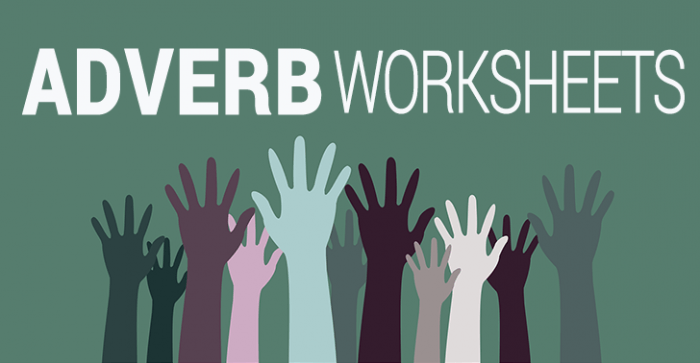
What is an Adverb?
While adjectives describe nouns, adverbs describe verbs.
The 5 types of adverbs help explain ‘how’, ‘when’ or ‘where’ an action takes place.
Also, it’s key to notice how adverbs often end with -ly. But they don’t have to.
These adverb examples use the verb ‘searched’.
- He quickly searched for his shoes. (Adverb of manner describes verb)
- He searched everywhere but couldn’t find it. (Adverb of place for “where”)
- Yesterday, he searched for his shoes. (Adverb of time for “when”)
Adverbs that add -ly at the end
In some cases, you can take an adjective and simply add -ly to form an adverb.
ADJECTIVE EXAMPLES:
- The cat is quick
Instead of describing a noun, an adverb describes or modifies a verb. In this case, the noun is the word ‘cat’. Because adverbs describe verbs, you need to add a verb in the sentence. Adverbs of manner tell us the way or how to do something.
ADVERB EXAMPLES:
- The cat runs quickly (adverb)
- She plays the violin terribly (adverb)
In this case, ‘quicky’ describes the speed at which the cat is running. But not all words ending with -ly is an adverb. For example, the word friendly below describes his grandparent’s personality and is an adjective.
ADJECTIVE EXAMPLES:
- He visited her friendly grandparents.
Adverbs that don’t end with -ly
However, not all adverbs end with -ly. For example, the words ‘fast’ and ‘well’ describe verbs but do not end in -ly.
IRREGULAR ADVERBS:
- The horse moved fast.
- She plays the piano well.
Other adverbs examples can modify adjectives but not the other way around. In other words, adverbs can combine with other adverbs to put more emphasis on the verb. For example, when you use ‘more’, ‘most’, and ‘least’, they can show degree when describing a been.
ADVERB OF DEGREE EXAMPLES:
- The music is extremely loud.
- He runs very quickly.
- When he wears his running shoes, he moves more quickly.
Adverbs Examples
In most cases for descriptive adverbs (adverbs of manner), you can take an adjective and simply add -ly to form an adverb. In general, adverbs of manner tell us the way or how to do something.
We cannot produce an exhaustive adverbs list because there are thousands of possibilities. But here are some of the most common adverbs examples in the English language.
Adverbs ending with -ly
- Easily
- Rapidly
- Loudly
- Playfully
- Gradually
- Correctly
- Clearly
- Enthusiastically
- Carefully
- Silently
- Happily
- Rarely
- Safely
- Quietly
- Terribly
However, not all adverbs end with -ly. For example, the words ‘fast’ and ‘well’ describe verbs but do not end in -ly. Finally, here are some adverbs that don’t with -ly.
Adverbs not ending with -ly
- Hard
- Fast
- Well
- High
READ MORE: All 12 Verb Tenses in English – Past, Present, and Future Verb Conjugation
👉 What is an Adverb?
Adverb is a word that modifies a verb, adjective, determiner, clause, preposition, or sentence.
Adverbs can tell you how something is done, for example, speak nicely or work hard. Adverbs can also tell you how much or how many of something you have.
👉 List of Adverbs
image source
Adverbs of time,
Adverbs of manner,
Adverbs of degree,
Adverbs of place,
Adverbs of frequency
The 5 Basic Types of Adverbs
Adverbs provide a deeper description of a verb within any sentence. There are five basic types of adverbs in the English language, namely that of Manner, Time, Place, Frequency, and Degree.
Here is a brief explanation of the meaning each has, along with example sentences using each type of adverb.
👉 Adverb Examples
👉 Adverbs of Time
An adverb of time provides more information about when a verb takes place. Adverbs of time are usually placed at the beginning or end of a sentence. When it is of particular importance to express the moment something happened we’ll put it at the start of a sentence.
Examples of adverbs of time: never, lately, just, always, recently, during, yet, soon, sometimes, usually, so far
- So far, we have found twelve grammar mistakes.
- I haven’t been going to the gym lately.
- We recently bought a new car.
👉 Adverbs of Place
Adverbs of place illustrate where the verb is happening. It’s usually placed after the main verb or object, or at the end of the sentence.
Examples of adverbs of place: here, there, nowhere, everywhere, out, in, above, below, inside, outside, into
- We went into the cave, and there were bats everywhere!
- One day when my dad wasn’t paying attention to where he was going, he walked into a wall.
- There aren’t any Pokémon here, let’s look somewhere else.
👉 Adverbs of Manner
Adverbs of manner provide more information about how a verb is done. Adverbs of manner are probably the most common of all adverbs. They’re easy to spot too. Most of them will end in –ly.
Examples of adverbs of manner: neatly, slowly, quickly, sadly, calmly, politely, loudly, kindly, lazily
- The young soldier folded his clothes neatly in a pile at the end of his bunk.
- I politely opened the door for my grandmother as she stepped out of the car.
- A fat orange and white cat rested lazily on the sofa.
👉 Adverbs of Degree
Adverbs of degree explain the level or intensity of a verb, adjective, or even another adverb.
Example of adverbs of degree: almost, quite, nearly, too, enough, just, hardly, simply, so
- Can I come to the movies too?
- Aren’t you hungry? You’ve hardly touched your dinner.
- I’m so excited to see the new James Bond movie!
👉 Adverbs of Frequency
Adverbs of frequency explain how often the verb occurs. They’re often placed directly before the main verb of a sentence.
Examples of adverbs of frequency: never, always, rarely, sometimes, normally, seldom, usually, again
- I rarely eat fast food these days.
- Tom usually takes his dog for a walk before breakfast.
- They always go to the same restaurant every Friday.
👉 Conjunctive Adverb
A conjunctive adverb is a type of adverb that joins two independent sentences or clauses of any kind. This type of adverb is used to connect two parts into one longer sentence.
These parts can be whole sentences that need to be connected into one longer sentence or smaller clauses that need to be connected as well.
Adverbs usually modify one verb, but conjunctive adverbs modify entire sentences because they connect larger parts than just one word.
Conjunctive adverbs are used to join together parts in order to form a larger thought. This means that the final sentence explains more than the two smaller ones would if they were still divided.
Conjunctive adverbs serve different functions, such as:
addition, comparison, concession, contrast, emphasis, summarize, illustrate a point, or signify time.
Conjunctive adverbs are used to connect ideas, and to form larger thoughts with longer sentences. These sentences are divided by a semicolon (;).
Here are some notable examples:
- I wanted to go have ice cream after work; however, my friend wanted something else.
- He had studies all day and night; nevertheless, it wasn’t enough to pass the test.
- It was never going to work between us; therefore, we decided to go our separate ways.
- I had to work the whole weekend; in addition, there was also another contract from a month ago I had to deal with.
- If you decide to start a diet you will see the improvement in your life soon; for instance, you’ll have more energy during the day.
- She was driving home from her friend’s place; meanwhile, her husband was busy preparing her a surprise.
👉 Adverb Clause
Usually, an adverb is just one word which modifies or describes, a verb. An adverb clause, on the other hand, is an entire clause which functions as an adverb. This clause is a group of words, or an entire sentence, which modifies a verb.
One adverb adds some detail to the verb. An adverb clause adds more detail to the verb and describes precisely. An adverb clause can answer questions like:
How? What? When? Where? How much? And others.
Like any clause, an adverb clause has to have a subject and predicate in order to be complete. An adverb clause can appear in the beginning, middle, or end of the sentence. The adverb clause is always divided by a comma if it’s in the beginning or middle of the sentence.
- Since I work from home, I don’t have to eat in restaurants often.
The adverb phrase is in the first sentence. The subject is “I” and the predicate “work,” so the clause is complete. This adverb clause answers the question: where?
- Whether you like it or not, you have to pay taxes.
Here the subject is “you” and the predicate is “like it or not.” There are different ways to form an adverb clause. This adverb clause answers the questions: how? and why?
- Whales, although they are large, don’t eat anything but plankton.
This adverb phrase is in the middle of the sentence, and it’s divided by commas. The subject is “they” and the predicate is “are large.” This adverb clause answers the question: how? (big are they / do they look)
- Because he missed the first bus he ran like his life depended on it.
Since the adverb phrase is at the end of the sentence is does not always need to be divided with a comma. The subject is “he” and the predicate “ran.” This adverb clause answers the questions: how? and why?
- I’m going to look for a new job when I get back from my trip.
Here the subject is “I” and the predicate is “get back.” This adverb clause answers the question: when?
👉 Adverb Phrase
An adverb phrase is a group of words that function as an adverb. Unlike the adverb clause, an adverb phrase does not need a subject and predicate. An adverb phrase is two or more words that modify the verb.
Adverb phrases are used to describe the verb in more detail than just one adverb would. Since they are composed of more than one word they can answer a different set of questions. Adverb phrases often answer the questions:
How? Where? Why? and When?
These questions need more than one adverb to be answered completely. An adverb phrase can appear anywhere in the sentence, and they don’t need to be divided by commas.
They are, however, mostly at the end of the sentence, and sometimes the beginning.
- Because the boss is late the meeting will start later than usual.
This adverb phrase is used to answer the question: when? It is at the end of the sentence and gives more details about why the meeting is not happening when it usually does.
- Like in every fairy tale they must kiss before sunset to break the curse.
This adverb phrase also answers the question: when? Here it describes the exact time when something must happen.
- Put the flowers on the kitchen table.
This adverb phrase answers the question: where? The person speaking wants the flowers to be put at a specific place.
- We used to have a holiday house right by the beach.
Here it is also answering the questions: where? It describes specifically where the house is, and how close to the beach it actually is.
- There were so many cars that they were moving frustratingly slowly.
This adverb phrase answered the question: how? It describes how slow the cars were going, and how the person feels about it. They are frustrated because of how slow they are going.
- She always completes her tasks without care.
The question answered is: how? It describes how careless the person is when completing her tasks.
- To understand better how to do the job she read some books.
This adverb phrase is at the beginning of the sentence and answered the question: why? It describes why the person has to read some books.
- He went online and searched all day for more information.
The question answered is: why? Here it describes why the person went online and had to search all day. Because they need more information they need to complete the search.
👉 Adverb vs Adjective
ADJECTIVES describe THINGS
a beach, a jacuzzi, a cocktail, the weather, an idea, sunglasses, your iPad, your flip-flops
and PEOPLE
a girl in English class, your upstairs neighbours, Beyoncé, Ryan Gosling, your mother-in-law, Dracula
- This jacuzzi is really uncomfortable.
- Beyoncé is so ambitious.
- Dracula was an affectionate man.
- Ryan Gosling is a spiritual person.
- Her sunglasses are insane.
- My upstairs neighbours are really energetic.
- It’s prohibited to burn tyres on thisbeach.
- Your iPad is so old-fashioned.
- My flip-flops are cute.
- Your mother-in-law is so upbeat.
- I met a magical girl in English class.
- That wasn’t a very good idea.
ADVERBS describe EVERYTHING ELSE
verbs: sing, laugh, complain
adjectives: prohibited, cute, upbeat
- Beyoncé sings loudly.
- Dracula laughed dramatically behind the curtain.
- I complain about my upstairs neighbours daily.
- It’s strictly prohibited to burn tyres on this beach. .
- My flip-flops are absolutely cute.
- Your mother-in-law is incredibly upbeat.
ADVERBS can even describe OTHER ADVERBS
- Beyoncé sings really loudly.
- She can sing incredibly beautifully.
- In Dracula’s castle, people disappeared surprisingly quickly.
Image Source
More for you:
List of Commonly Used Participial Adjectives!
Order of Adjectives
👉 Adverbs of Frequency
What is an adverb of frequency?
Adverb of frequency is a word that tells us how frequently or how often something happens.
- I always eat breakfast in the morning, even when I am late for work.
1. List of the most common adverbs of frequency:
- always
- usually
- sometimes
- never
- occasionally
- rarely
- seldom
- frequently
- often
- regularly
- hardly ever
2. Position in a sentence
a) We usually put the adverbs of frequency in the middle of the sentence, between the subject and the verb, but after auxiliary verbs:
- I often go to the beach.
- He sometimes visits his grandma.
- They usually drink coffee in the mornings.
- I hardly ever help my mom in the kitchen.
b) Auxiliary verbs:
- He is usually very happy.
- We are always helping the children at school.
- I have never done anything bad.
- She is always cooking pasta.
NOTE: the verbs have, has, and had are auxiliary verbs only when used with past participle:
- I have never eaten a snake.
- She has never tried coconut water.
But has, have, and had are normal verbs when they are not used with past participle:
- I always have my lunch at school.
- He seldom has English classes.
- We often had dinner late at night in college.
c) We can put occasionally, frequently, usually, often and sometimes in the beginning of the sentence in order to make it stronger. However, other adverbs do not sound good in the beginning of the sentence:
- Occasionally, I go to the beach.
- Sometimes he visits his grandma.
- Usually, they drink coffee in the mornings.
- Always I go to the beach. INCORRECT
- I always go to the beach. CORRECT
- Often, I go to the beach. INCORRECT
- I often go to the beach. CORRECT
NOTE: the verbs do, does, and did are auxiliary verbs only when they are used in questions or negatives:
- Do you often go to the cinema?
- He doesn’t always eat grapes.
In other cases, do, does and did are normal verbs:
- She never sleeps at home.
- They rarely did their chores.
If the auxiliary verb is negative the adverb of frequency might go before or after it:
- He doesn’t usually cook at home.
- He usually doesn’t cook at home.
- They don’t often go to the cinema.
- They often don’t go to the cinema.
BUT:
- We aren’t always late for work.
- We always aren’t late for work. INCORRECT (say ‘We are never late for work’)
e) In the question, we put the adverbs of frequency before the main verb:
- Do you often go to the beach?
- Do you sometimes visit your grandma?
BUT:
- Is she always late for soccer practice?
- Are they usually so grumpy?
I hope you find this information useful.
👉 Adverbs of Time
image source
- Always
- Already
- Annually
- Before
- Constantly
- Daily
- Early
- Earlier
- Eventually
- Ever
- Frequently
- Finally
- First
- Formerly
- Fortnightly
- Generally
- Hourly
- Immediately
- Infrequently
- Just
- Last
- Late
- Later
- Lately
- Monthly
- Not until
- Now
- Normally
- Never
- Next
- Often
- Occasionally
- Previously
- Quarterly
- Rarely
- Regularly
- Recently
- Seldom
- Sometimes
- Since
- Soon
- Still
- Then
- Today
- Tomorrow
- Tonight
- Yesterday
- Usually
- Yet
- Weekly
- Yearly
👉 Adverb -LY
👉 Adverbs of Quantity
Adverbs can tell you how something is done, for example, speak nicely or work hard. Adverbs can also tell you how much or how many of something you have.
Every noun is either countable (cat- cats, dog- dogs, elf- elves, fairy- fairies etc.) or uncountable (time, information, magic, happiness, witchcraft etc.) and this is something you need to consider when choosing an adverb to go together with a noun.
COUNTABLE NOUNS
With countable nouns, you may use the following adverbs:
MANY / MORE
- My neighbour has many cats and she wants more.
A LOT / LOTS
- I want a lof of dogs and I want lots of cats too!
FEW / FEWER
- There are just a few fairies left in the forest and soon there will be fewer.
TOO MANY / TOO FEW
- There are not too many fairies left and there are too few elves.
(NOT) ENOUGH
- You can’t have enough cats!
UNCOUNTABLE NOUNS
MUCH / MORE
- I haven’t got much time to spend with my dogs. I need more free time.
A LOT / LOTS
- There’s a lot of magic in this forest and lots of witchcraft.
LITTLE / LESS
- I have little information on witches and even less on dragons.
TOO MUCH / TOO LITTLE
- You spend too much time with your dogs and too little with your friends.
(NOT) ENOUGH
- That’s enough happiness for a lifetime.
You can also use adverbs to describe the degree to which something is. These adverbs may be used BEFORE ADJECTIVES (powerful, friendly, kind, crazy, rude, scary, dark etc.)
TOO
- This spell is too powerful, don’t use it indoors.
SO
- It’s so powerful, it can turn a hundred people into frogs.
A LITTLE (BIT)
- Be careful with that cat lady. She’s a little bit crazy.
ENOUGH (comes after the adjective)
- She’s a nice person, she’s just not friendly enough.
(NOT) VERY
- I would say she’s very rude.
QUITE
- This forest is quite scary.
RATHER
- That dragon is rather scary, too.
PRETTY
- It’s pretty dark in here.
👉 Adverbs Lesson Plan (PDF) 👈 click here to download
📥
👉 Noun + Adverb Examples
Hanger on: is a person who attaches themselves to another person or a group for the sole purpose of trying to gain something from that person or group.
What the person gains can be anything that they see as advantageous. It can be something as small as attention and as large as financial gain. People in a position of fame or power often have or are exposed to people who hang on to them.
- There were many hangers on at the concert tonight.
- Unlike those hangers on, I’ve been friends with her since we were kids, and I want nothing from her.
Passerby: is simply a person who is going by something. This word is usually used to describe someone who is walking. The person may be walking by something of significance, or they could just be walking by a restaurant.
- We love to watch all the passersby as we eat our lunch near the window.
- A random passerby was a witness to the crime.
Overcoat: is a long warm coat, that is worn in colder months over fall or winter clothes.
- I’m going to the store to shop for a new overcoat for the winter.
- She wore a beautiful bright red overcoat.
Overcoat can also refer to the top layer of paint. It’s usually a clear layer of paint that is used to protect other paint colors.
- As soon as we put on the overcoat we’re all done painting the house.
- Wow, you made a beautiful painting, make sure you put an overcoat layer on it to protect it.
Afterthought: is something that is thought of later, or it can be something that is added later. What is forgotten could be a thought or a thing, or even a person. It can be anything that someone thinks of later or after the fact.
- We didn’t actually plan to invite him to the birthday party, the invitation was an afterthought.
- We got to the store and then at the last minute decided to get a cake, it was an afterthought.
Undertone: refers to a feeling or quality that is underneath the surface. For example a family may seem happy and perfect, but you can tell that there’s something negative or unhappy underneath the surface that they don’t talk about publicly. That negative covert feeling is an undertone.
- Even Though she was always smiling, there was a sad undertone, and you could tell she missed her sister.
- Despite all of the arguing there was a clear undertone of love between the couple.
An undertone can also be a muted or quiet sound or color. As a sound it could be murmuring or whispers. As a color, an undertone is simply a non bright or vibrant color.
- When he walked into the room, he could hear the other students talking in undertones.
- I don’t want the color to be too bright, maybe a pink undertone.
Foresight: refers to the ability to predict or anticipate the future. Foresight does not refer to being psychic or making psychic predictions. It refers to someone being able to anticipate someone’s needs or something that’s going to happen based on research or preparation. For example an assistant that can predict his or her boss’ needs has foresight.
- Part of what makes her so great at her job is her foresight.
- A good CEO must have foresight, especially during turbulent times.
Overload: refers to someone or an organization being overwhelmed or having too much going on and it is becoming a burden. It can refer to a mental burden, or it can refer to there physically being too much weight.
- He felt overloaded by all of the work that he had to get done by Friday.
- The truck was overloaded and the trucker had to remove some of his cargo in order to meet the weight limits requirement.
Outpatient: is a medical patient that is not treated in a hospital, but at their home or at a different facility. Sometimes a patient will have a procedure and then will be sent home to recover. The doctor will still check to see that their recovery is going as scheduled, or they may be visited by a nurse, but they will not have to stay overnight at the hospital. This is an outpatient.
- After surgery, you will spend 2 days in the hospital and if everything goes well, you will be treated as an outpatient.
- Having the care of a nurse allows him to be able to be cared for as an outpatient.
👉 Adverb Placement
Using adverbs in a sentence is quite flexible, still it is not entirely our choice where we place them; there are some general rules that we should follow.
For example, adverbs are not usually put between a verb and its object. The typical word order is this:
adverb + verb + object: We often visit museums.
verb + object + adverb: She speaks English well.
In the verb + preposition + object structure the adverb can go either before the preposition or after the object:
- She looked at me suspiciously.
- She looked suspiciously at me.
But if the object contains several words, the adverb goes before the preposition:
- She looked suspiciously at everybody in the room.
Connecting adverbs (which join clauses, e.g. then, next, besides, still, anyway, suddenly, however, consequently) and comment adverbs (e.g. fortunately, surprisingly) can go in front position:
- However, the plan wasn’t fully discussed.
- He worked until six o’clock. Then he left the office.
- Next, I’m going to speak about the advantages of the plan.
- Suddenly there was a loud noise.
- Fortunately, we could take a bus to the village.
Adverbs of indefinite frequency (e.g. always, often, usually, rarely, sometimes, never, normally, generally, occasionally) and adverbs of certainty (e.g. surely, definitely, certainly, probably, perhaps) usually go in mid-position:
- My father often travels to France.
- We rarely go out on Mondays.
- Her brother has never flown an airplane.
- I’ve definitely decided to leave this town.
- She will probably be absent at the meeting.
- The party has obviously been cancelled.
Adverbs of indefinite frequency can also go in end position if they are the main focus of the message (but mid-position is more typical):
- We see our cousins quite often.
- She is very nervous sometimes.
- They eat out occasionally.
Adverbs of certainty like maybe and perhaps typically take front position:
- Perhaps they can’t find the way to the village.
- Maybe you’re right, or maybe not.
Adverbs of manner (saying how the action happens), place (where) and time (when) most often go in end position:
- The secretary read the letter slowly.
- He answered all the questions correctly.
- My sister is sleeping in her room upstairs.
- Did you phone her last night?
- We arrived at the station at ten.
Time adverbs (especially the ones that are frequently used like tomorrow, yesterday, this month, every week, soon, etc.) can also go in front position, especially if the adverb is not the main focus of the sentence:
- Tomorrow we’ve got a meeting with the general manager.
- This week I’m staying with my uncle in the country.
- Soon you’ll see a church, take the second street behind it.
Place adverbs most often go in end position, but front position is also possible (though not very typical):
- At the end of the corridor there was a staircase.
- In this town they don’t have too many restaurants.
- Here we can stop.
Adverbs in -ly can also go in mid-position:
- The train slowly crossed the bridge.
- He angrily shouted at the doorman.
- They will possibly be late for the party.
- She suddenly ran out of the room.
- Would you kindly wait?
Emphasizing adverbs (e.g. very, extremely, terribly, just, almost, really, right) go directly before the words that they emphasise:
- I knew she played the piano very well.
- We were extremely annoyed with his manners.
- I’m terribly sorry about last night.
- Let’s meet in front of the cinema just before seven.
- He kicked the ball almost over the building.
- I’m really sleepy now.
- The police officer walked right past us.
Please note that certain adverbs used at different places of the sentence can substantially change the meaning:
- Only I have fish and chips; nobody else has it.
- I only have fish and chips; I don’t have a drink.
- I have only fish and chips; I don’t have anything else.
- I have fish and chips only; I don’t have rice and peas.
In general, if there are more than one possibilities of placing an adverb in a sentence, you should always be aware of the possible changes in meaning:
- They secretly decided to leave the town. – Their decision was secret.
- They decided to leave the town secretly. – Their departure was to be secret.
ADVERB IN SPANISH:
Adverb = adverbio
ADVERB IN FRENCH:
Adverb = adverbe
☝️ I sometimes cannot fall asleep vs I cannot sometimes fall asleep.
“I cannot sometimes fall asleep” is the correct positioning of this sentence. Sometimes is an adverb of frequency. Adverbs of frequency include often, rarely, never, always, usually,etc.
The rule for the position of adverbs of frequency is they are usually placed before the main verb after a modal verb such as would, should, can, may, etc.
Let’s take a look at some examples:
- They always go to the cinema on Friday nights.
- I never travel by bus.
- The teachers occasionally bring sweets to class.
- He should never hang out with those people again, they are dangerous.
- We can always tell when they are lying.
- I would never quit my job, I love it here!
There is an exception to this rule, if the verb to be is used the adjective must be placed AFTER the verb. For example:
- I am always on time.
- We are never absent from class.
- They were sometimes sent to the principles office.
Some adverbs of frequency can be placed at the beginning or at the end of a sentence to emphasize something.
- Sometimes I can’t concentrate.
- I can’t concentrate sometimes.
- Occasionally they fight.
- They fight occasionally.
Therefore, you could say,
- Sometimes I cannot sleep.
- I cannot sleep sometimes.
This will put emphasize on the fact that you can’t sleep at times.
👉 Adverb JUST
How to use ‘just’? Can you explain the meaning of this adverb?
JUST (adverb)
1. exactly
- This is just what I need.
- This place is just the way I imagined.
- That’s just enough.
2. simply, only, no more than
- It was just another mistake.
- He’s just a friend.
- I met him just two days ago.
3. a short time ago
- I’ve just received a phone call.
- They’ve just bought a new car.
- She’s just finished work.
4. barely, by a narrow margin
- I just caught the train before it pulled out of the station.
- The bullet just missed him.
- He arrived just in time.
Changes in the word order and meaning:
a, Just two weeks ago, Peter won a thousand pounds. (not more than two weeks ago)
b, Two weeks ago, just Peter won a thousand pounds. (no one else won, only him)
c, Two weeks ago, Peter won just a thousand pounds. (not more than a thousand pounds)
☝️ Adverbs: IN the End – AT the End, Still – Yet, AT the Moment – Actually …
☝️ Where is the position of an adverb in question form and in negative form?
I don’t clear the position of adverb of frequency-place in a sentence. I only know form
Subject +adverb + verb +object
Ex: I always get up late.
Subject + verbe+ adverb +object
Ex: He is usually happy.
But, I don’t clear the place adverb. Where is the position of an adverb. In question form and In negative form.
So, you go it write in positive sentences! Well done!
Now, let’s take a look at negative and questions:
- I don’t always get up late.
- He isn’t usually happy.
So, as you can see, in the negative sentences the adverb of frequency comes right after the negative part (don’t/doesn’t/isn’t/aren’t)
Now, questions:
- Do you always get up late?
- Is he usually happy?
After the subject in questions
I hope it’s clear now.
☝️ Is Correctly an adverb of manner?
An adverb of manner is an adverb, or a modifier of a verb, that tells us how something is done.
Common adverbs of manner are well, badly, gently, silly, and friendly.
Because correctly describes the way that some action is completed, it can be an adverb of manner.
For example, in this sentence:
- She correctly guessed that the interviewer was trying to test her.
In this case, correctly describes the way that the subject of the sentence guessed.
☝️ Can we insert an adverb like this?
Can we break the infinitive and insert an adverb like this?
Your page says…
“6 Ways to Immediately Improve Your English Communication Skills.”
Worth noticing is the infinitive “To improve”. Can we break the infinitive and insert an adverb like this. Should it not have been “6 Ways to Improve Your English Communication Skills Immediately”?
Waiting to hear from you..
Regards,
DEEPAK
MyEnglishTeacher.eu answers:
Hi Deepak!
Splitting the infinitive as is done here is perfectly fine!
There is nothing grammatically wrong with saying “Ways to Immediately Improve Your English”. In fact, both titles are grammatically correct. You can say either one, and they mean the same thing.









